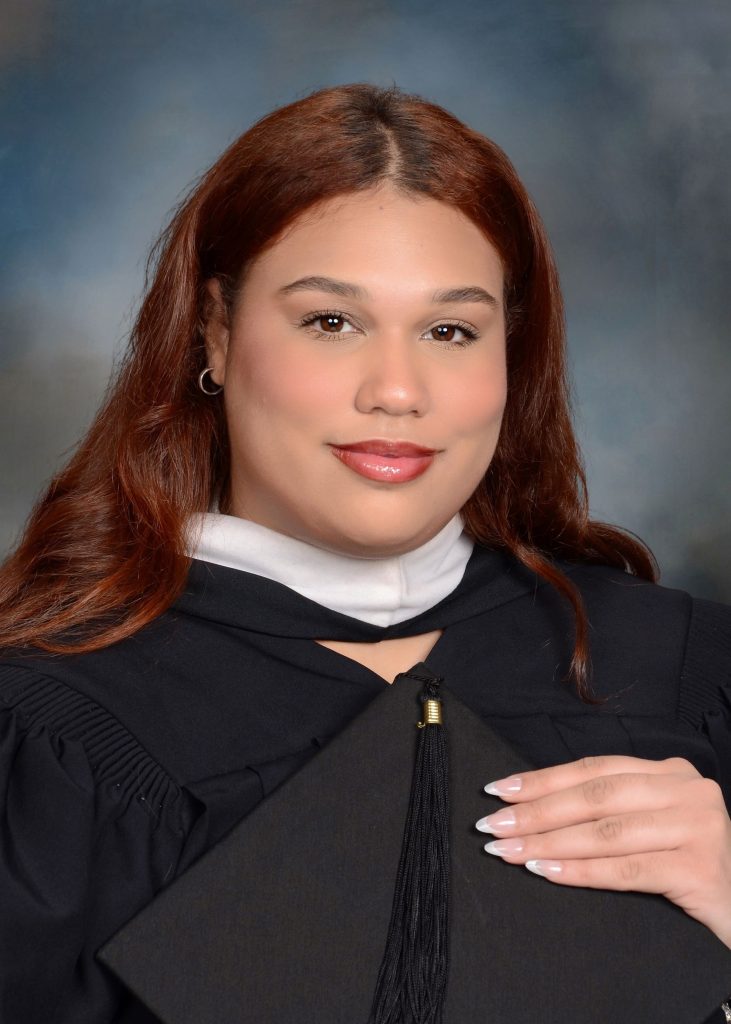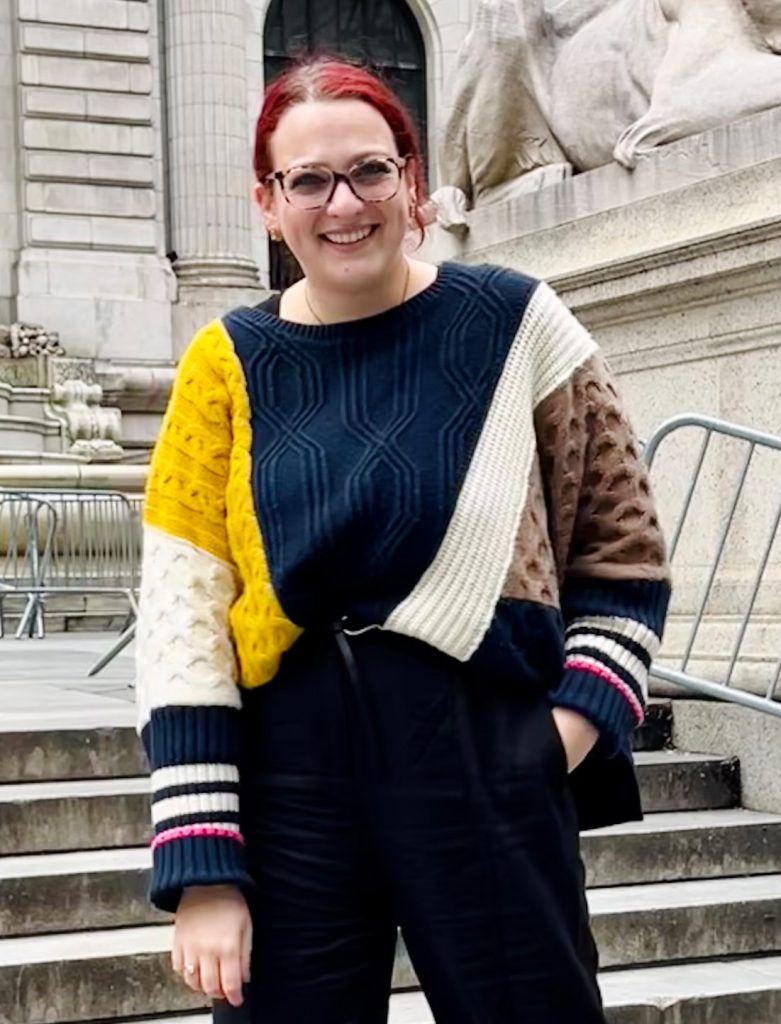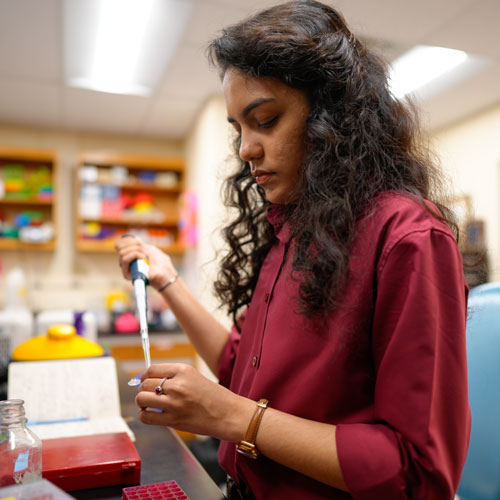Awardees will travel to countries in Asia, the Americas, Africa, and Europe for 10 months of teaching and research, immersing themselves in new cultures. The University announced 12 Fulbright winners in early May; the number rose to 14 a few weeks later, and has now risen to 15, because of awards granted to students who had been named Fulbright alternates.
“We are overjoyed that we have a record number of Fulbright awardees this year! It’s a testament to the outstanding work of our students and alumni, and the faculty and staff who support them,” said Lorna Ronald, Ph.D., director of Fordham’s Office of Prestigious Fellowships.
She noted that Fordham’s number of applicants has risen from 25 to 38 over the past two years. “We’re working hard to let all our students know that they can apply,” she said. “There is no GPA cutoff or ‘right’ type of student. Fordham students are interested in service, and many have studied abroad, speak multiple languages, or come from multicultural backgrounds, so they make excellent Fulbright candidates.”
In February, for the sixth time, the U.S. State Department recognized Fordham for being one of the colleges and universities with the highest number of Fulbright awardees.
A Focus on Immigrants and Refugees
Jennifer Espinal, FCRH ’24, who grew up in the Bronx, is headed to Spain’s La Rioja province to work as an English teaching assistant. She hopes to expand her knowledge of Spanish—“I speak very ‘Nuyorican’ Spanish,” she joked—and learn more about the nation’s culture and its large refugee population.
Espinal double majored in history and Latin American and Latino studies, with a political science minor, and wants to become an attorney who serves immigrant families. She comes from one herself—her parents immigrated from the Dominican Republic, and her mother works as a custodian at the Rose Hill campus.
Seeing her daughter graduate on May 18 was an emotional moment. “None of this would be possible without you,” Jennifer told her in Spanish that morning. (Watch Espinal and other first-generation graduates give thanks to their families at commencement.)
Making Early Childhood Education Inclusive
Bailey Kaufman, a doctoral candidate at the Graduate School of Education and adjunct professor at the school, will be traveling to the Slovak Republic to study early childhood math instruction, as well as the cultural biases in educational materials that can hinder learning.
One aspect of her research is the bias in picture books used to teach math and how that makes them less accessible to children from the country’s Romani minority. Romani children are already marginalized, Kaufman said, noting that only a third of them are enrolled in early childhood programs, compared with the republic’s national average of 72%.
Based at the University of Prešov, she’ll work with European organizations seeking to improve early childhood education and build a comparative analysis. A question she hopes to answer, she said, is “how are other countries approaching mathematics in early childhood and training future teachers, and what can we take from that and bring to U.S. institutions of higher education?”
Studying National Identity in Wales
In addition to the 15 Fulbright scholarships, one student was accepted into a different Fulbright program, the highly competitive U.K. Summer Institute for first- and second-year college students. Mackenzie Saenz De Viteri, a CSTEP Summer Scholar and first-year student at Fordham College at Lincoln Center, will spend three weeks at Aberystwyth University in Wales.
She looks forward to learning directly about Wales’ history and identity, as well as how the country attained independence and structured its government, which may hold lessons for Puerto Rico, said De Viteri, an international studies and anthropology double major from Central Islip, New York.
Her interest is “taking examples from other parts of the world who have similar dilemmas and using that to help solve current issues,” said De Viteri, a first-generation college student who has family in Puerto Rico.
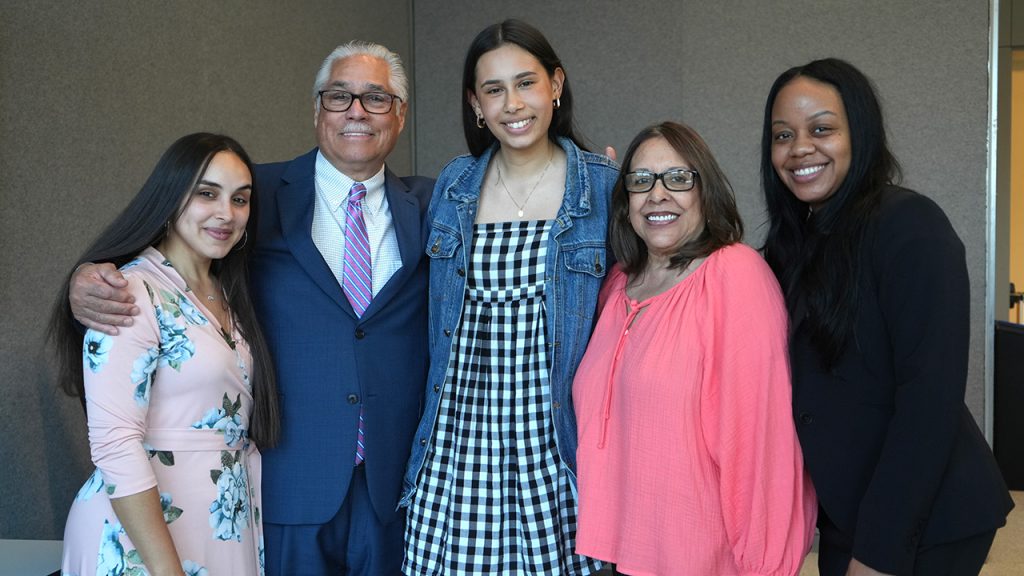
In addition to Kaufman and Espinal, 13 other students and alumni received awards from the Fulbright U.S. Student Program:
Caroline Albacete, FCRH ’21, from Pennsylvania, a member of the Honors Program who earned a bachelor’s degree in international studies, with minors in French and history, was awarded an English teaching assistantship to Colombia.
Michael Au-Mullaney, from the Bronx, a doctoral candidate in philosophy in the Graduate School of Arts and Sciences, received a research award for study in Denmark.
Richard (Ricky) DeSantis, from California, a doctoral candidate in philosophy in the Graduate School of Arts and Sciences, received a Fulbright-ifk Junior Fellowship for study in Austria.
Alexandra (Alex) Huey, FCRH ’23, from Florida, who earned a bachelor’s degree in mathematics and computer science, with a minor in economics, received a Fulbright-CY Initiative Award to pursue a master’s degree in Paris, France.
Nathan (Nate) Johnson, LAW ’22, who is from New York City and earned a juris doctorate, received a Fulbright/Ulster University Award to pursue an LLM in Northern Ireland.
Kathleen Kye, FCLC ’22, from New Jersey, who earned a bachelor’s degree in sociology and Spanish studies, with a minor in psychology, was awarded an English teaching assistantship to Argentina.
Sophia Maier, FCRH ’23, from New York state, who earned a bachelor’s degree in American studies and will receive a master’s degree from the Graduate School of Education this spring, was awarded an English teaching assistantship to Spain.
Isaac Mullings, FCRH ’24, from the Bronx, a member of the CSTEP program who earned a bachelor’s degree in psychology, received a research award for study in Ghana.
Anna Nowalk, FCLC ’23, from Virginia, who earned a bachelor’s degree in theology religious studies with minors in philosophy and peace and justice studies, received a research award for study in El Salvador.
Christian Ramirez, FCRH ’23, who is from Minnesota and earned a bachelor’s degree in English and theology religious studies, with a minor in Spanish, was awarded an English teaching assistantship to Colombia.
Margaret (Daisy) Salchli, FCRH ’24, from Chicago, who earned a bachelor’s degree in political science, international studies, and Chinese studies, was awarded an English teaching assistantship to Taiwan.
Emilia Tesoriero, FCRH ’24, from Connecticut, who earned a bachelor’s degree in international political economy with a minor in Spanish, was awarded an English teaching assistantship to Spain.
Connie Ticho, LAW ’24, from Pennsylvania, received a research award for study in South Africa.
One alumnus is a Fulbright alternate:
Hanif Amanullah, FCRH ’24, from Texas, who earned a bachelor’s degree in international studies with a minor in environmental studies, was named an alternate for a study and research award to Kenya.
Editor’s note: This story has been updated from an earlier version.
]]>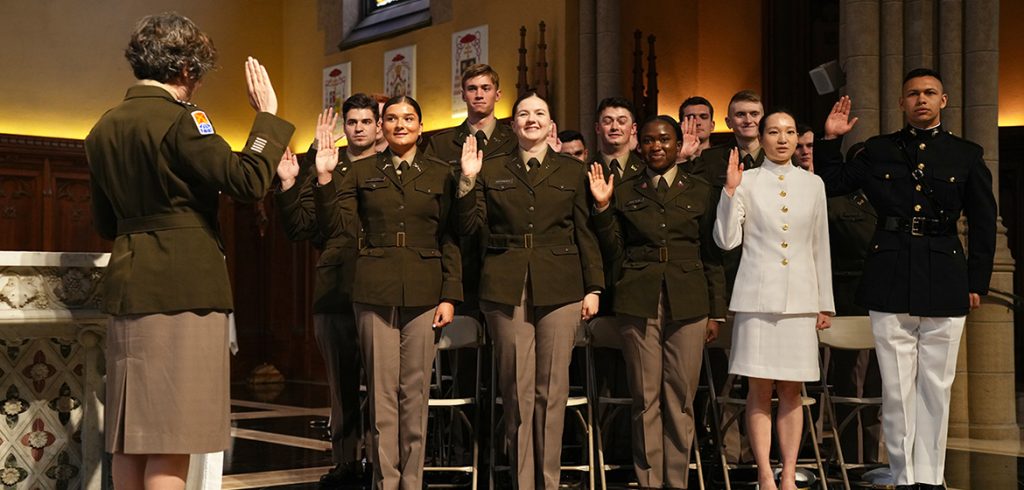
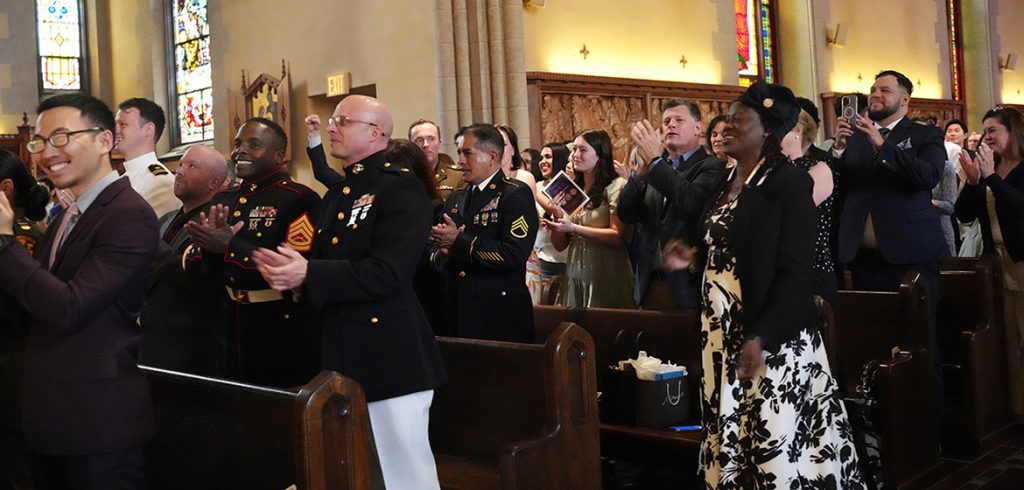
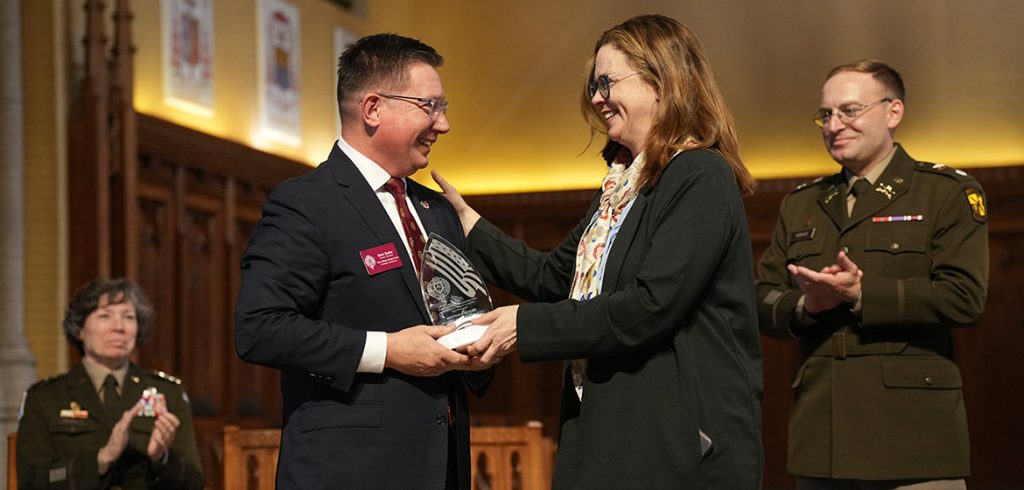
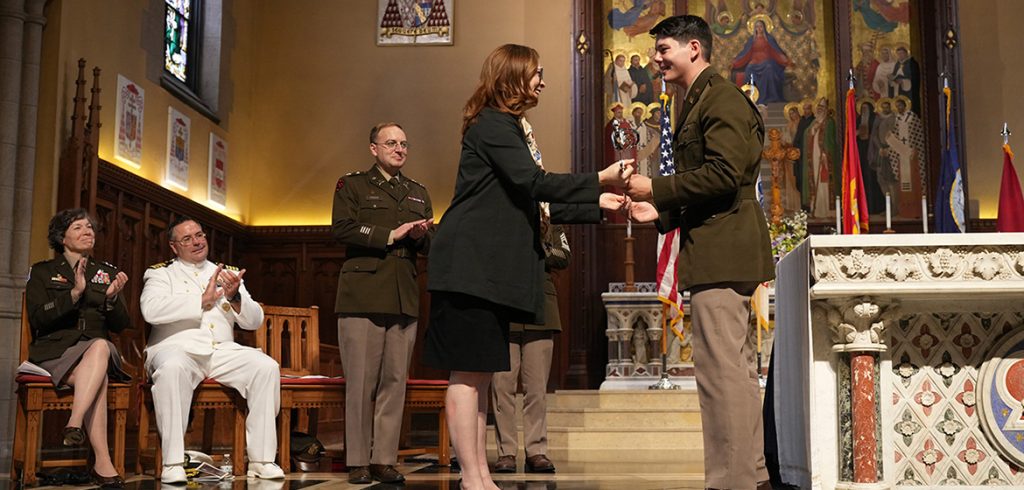
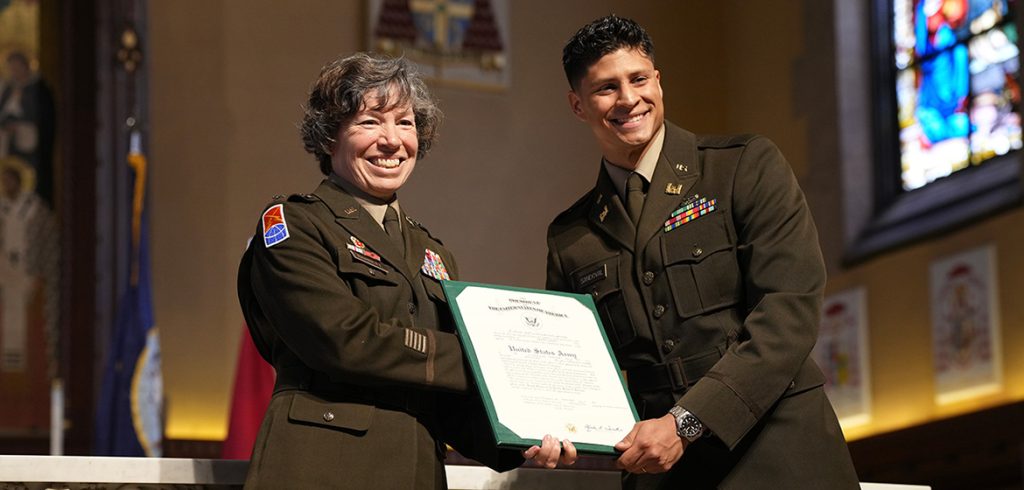
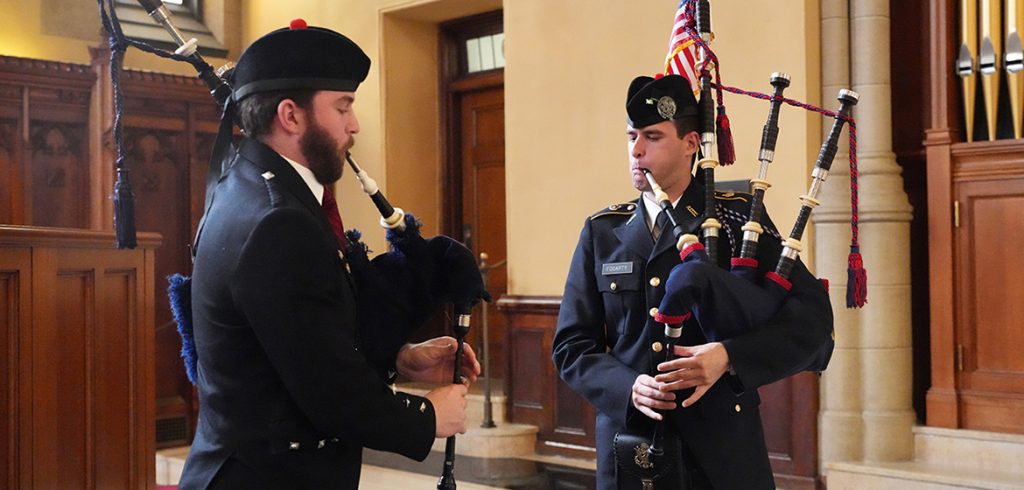
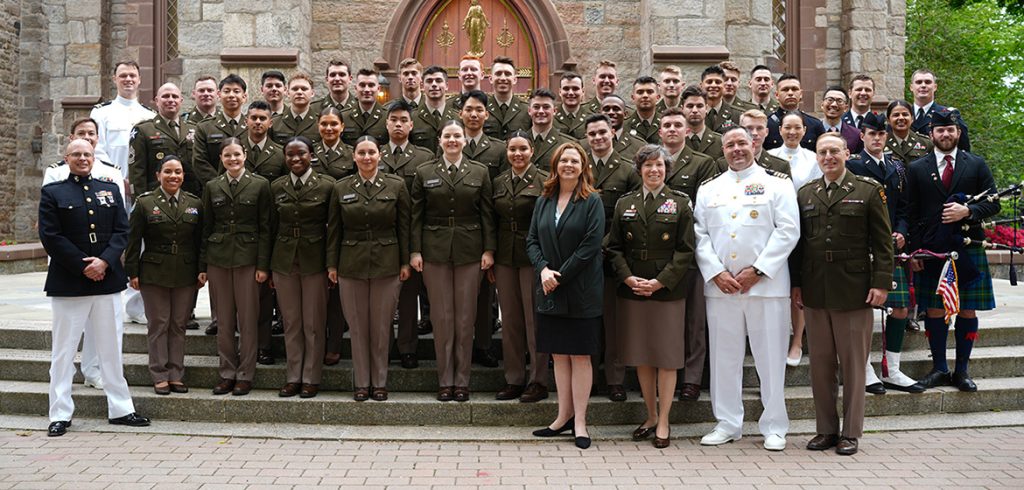
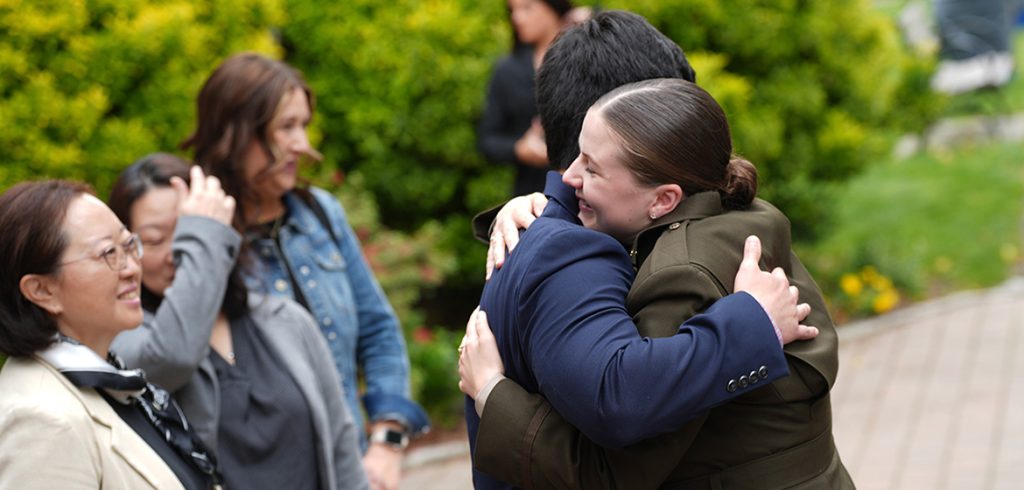
Photos by Taylor Ha
Thirty-three cadets officially began their military leadership careers on May 17 at Fordham’s Rose Hill campus. At the 94th commissioning ceremony for Fordham’s Army and Navy ROTC program, speakers praised this year’s cadets for all they had accomplished so far while also describing what’s required of those who lead America’s soldiers and sailors.
For one thing, the guest speaker said, there are no days off.
“You are leaders 24/7, 365,” said Lt. Gen. Maria Barrett, commanding general of the U.S. Army Cyber Command, at the ceremony held at the University Church. “Lead by example. … You should hold yourself to a higher standard, because trust me, soldiers notice everything their leaders do.”
She conferred several other lessons gleaned from her 36-year career: Get to know your troops. Listen to noncommissioned officers; they’ll tell you what you need to hear. When you inevitably make a mistake, “get over it, fast,” and learn from it. Enjoy yourselves, as hard as it may be sometimes, and serve with passion and zest. Set high standards, communicate them clearly, and hold your service members accountable.
“At the end of the day, soldiers want to be part of a winning team, and they want a leader they trust and respect,” Barrett said.
Love-Driven Leadership
She then administered the oath of office to the cadets, who came from several New York-area universities including Fordham, which was to hold its University-wide commencement the next day. Most cadets were bound for the Army, the Army Reserve, and Army National Guard. One was commissioned in the Navy and one in the Marine Corps. One cadet, Miguel Angel-Sandoval, was an Army enlistee who would take part in a Yellow Ribbon ceremony honoring Fordham’s student veterans later that day.
Lt. Col. Paul Tanghe, Ph.D., professor of military science and the officer in charge of the Army ROTC program, noted the diversity of the cadets: they comprised 24 ethnicities and hailed from 11 states as well as countries as far away as South Korea and Senegal. And 40% were multilingual, speaking a total of 13 languages, Tanghe said in his remarks.
He lauded the cadets for demonstrating the love-driven leadership exhorted by two of their recent class dinner speakers, not to mention St. Ignatius Loyola, founder of the Jesuit order, and legendary football coach Vince Lombardi, FCRH ’37.
“Love-driven leadership is how great officers lead, it’s how the Jesuits educate, it’s why ROTC has the home and the partnership that we have here at Fordham,” Tanghe said.
Cadets received various awards and honors, including the President’s Saber, presented to Brian T. Inguanti, a member of Fordham College at Rose Hill’s Class of 2024 who was headed for the Army Corps of Engineers. The Rev. Joseph M. McShane Award for Excellence in Faculty Support to ROTC was presented to Matthew Butler, PCS ’17, senior director of military and veterans’ services at Fordham.
In her own address, Fordham’s president, Tania Tetlow, noted the essential role played by the cadets’ family members gathered in the University Church.
“You have raised, supported, challenged, inspired these extraordinary men and women graduating here today,” she said. “You have rooted them in service, you imbued them with courage, and so we are so grateful for you this morning.”
]]>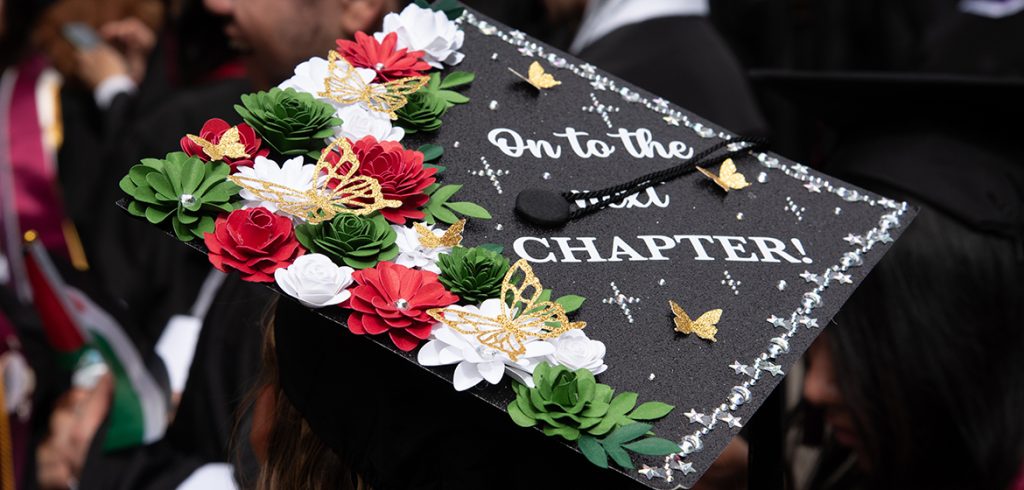
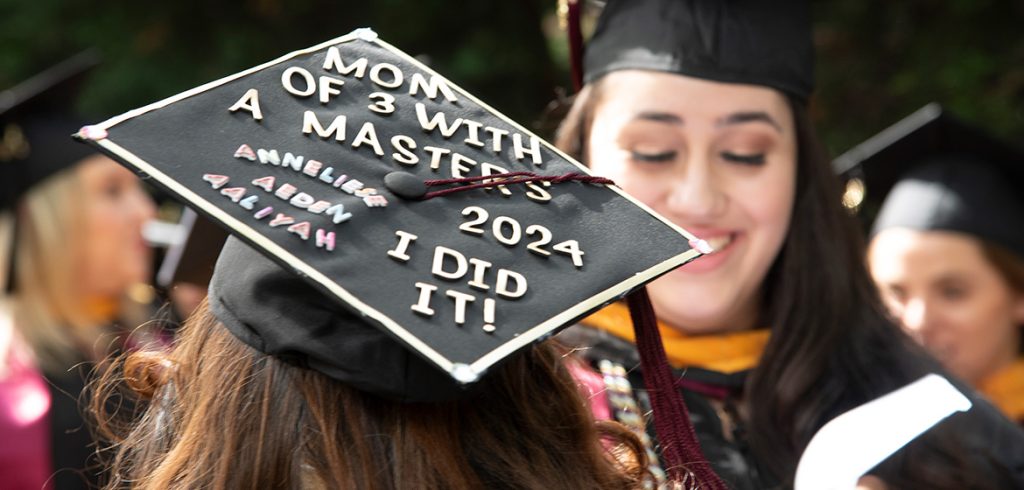
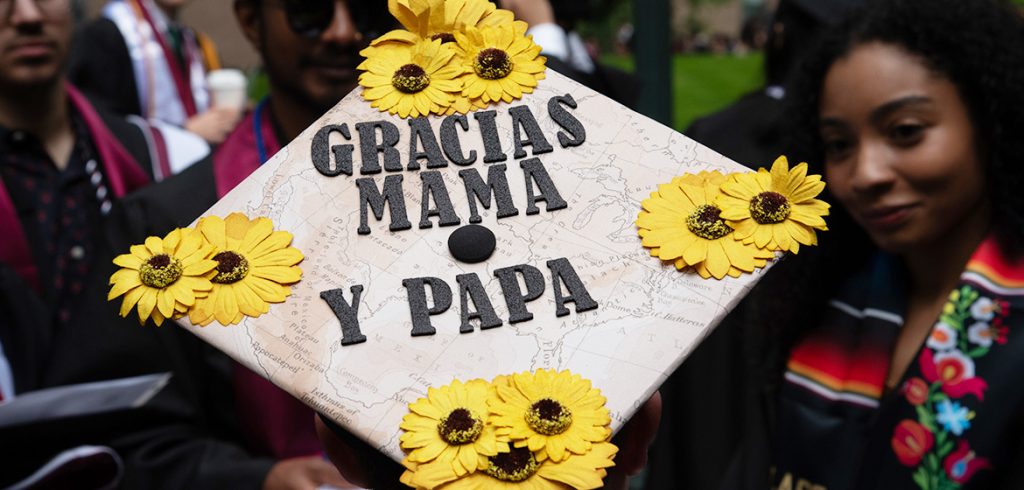
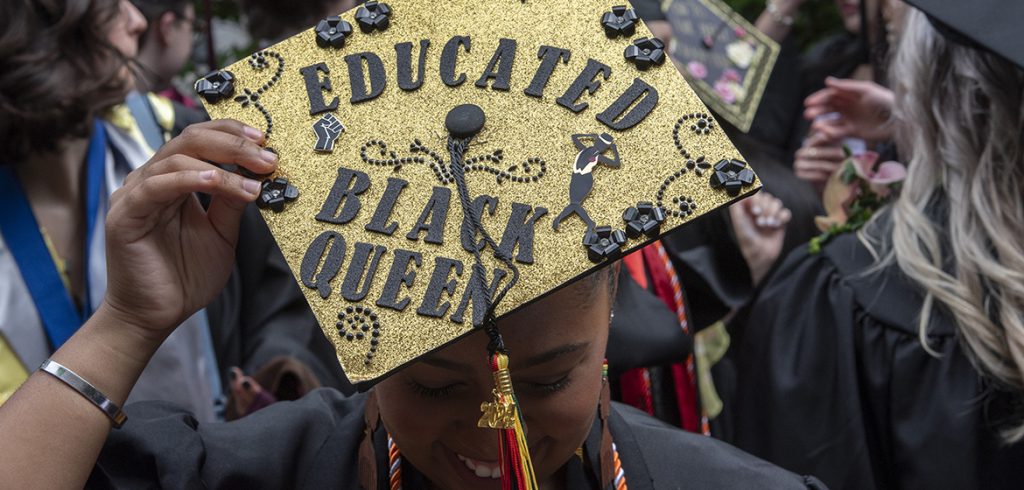
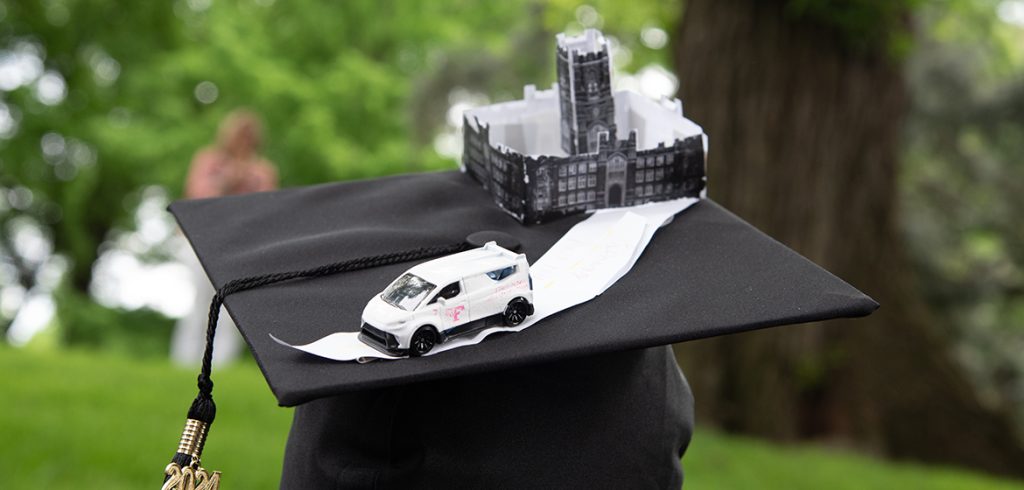
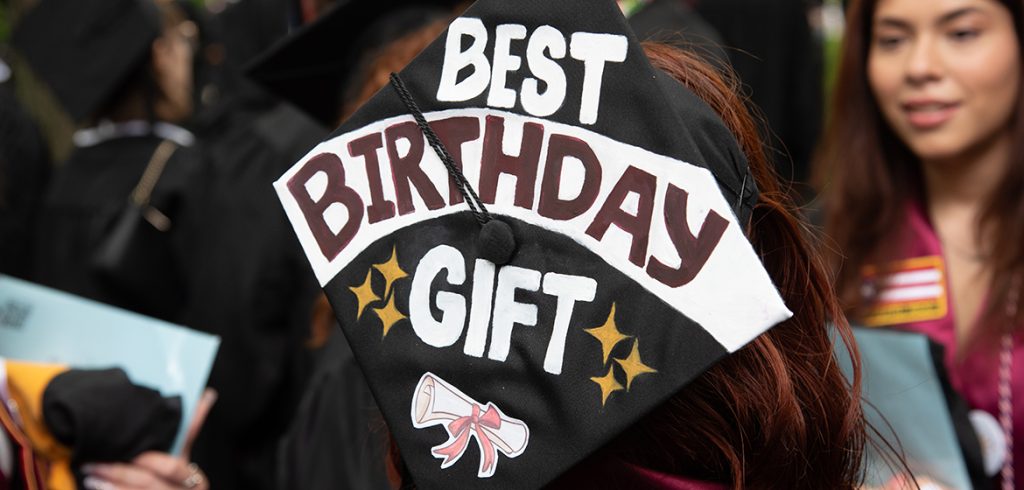
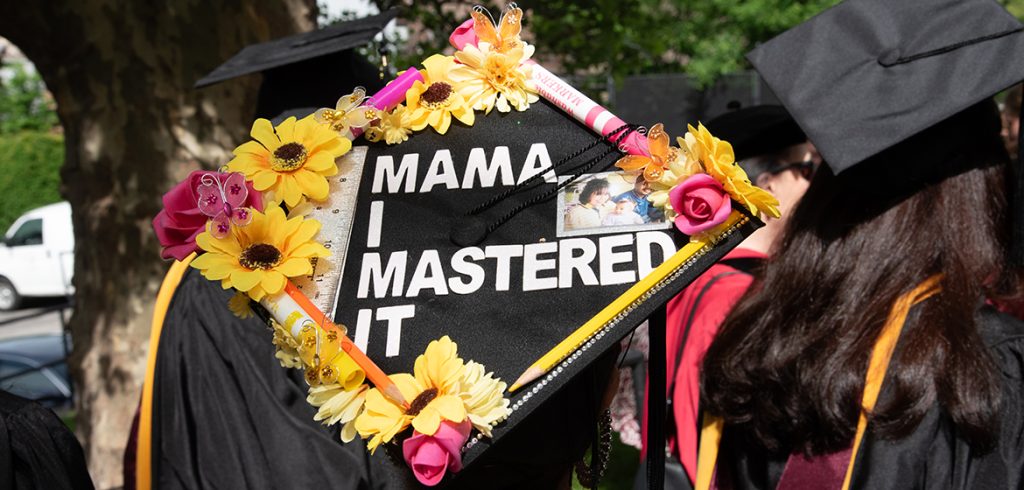
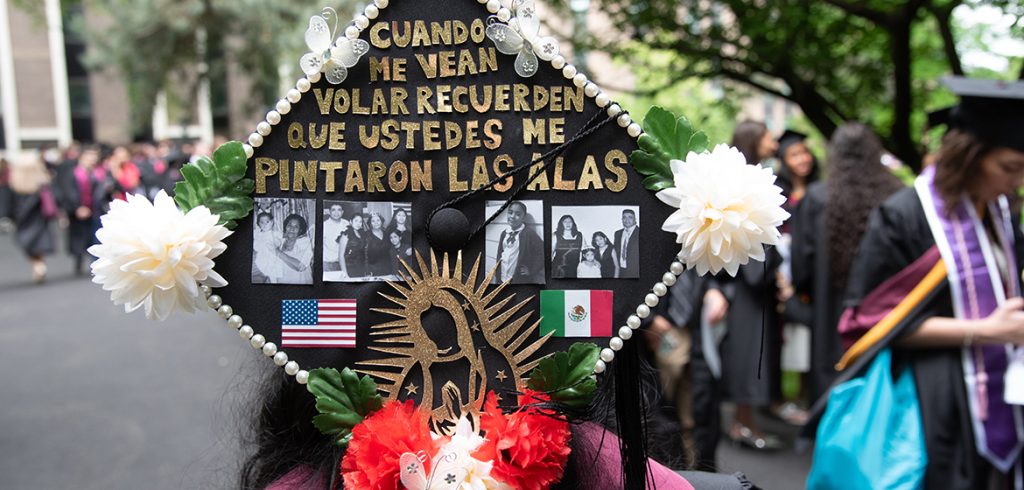
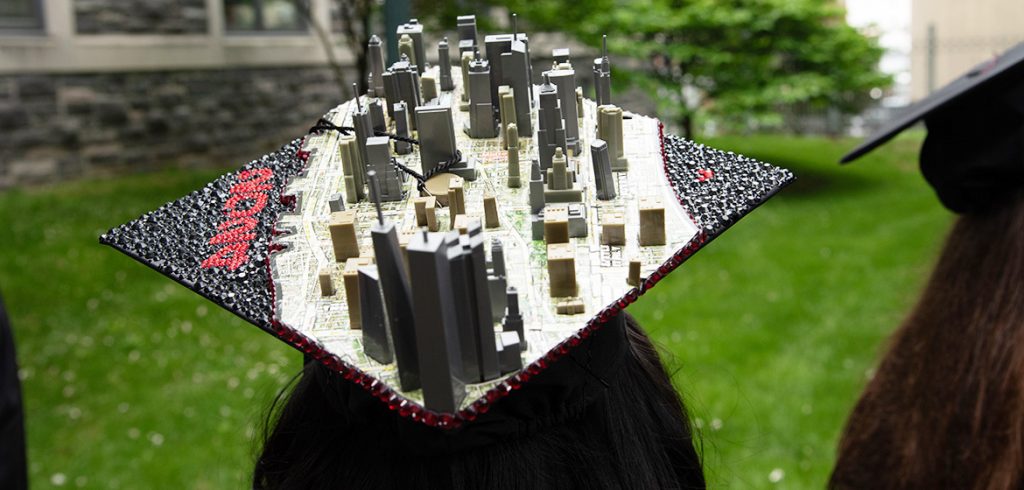
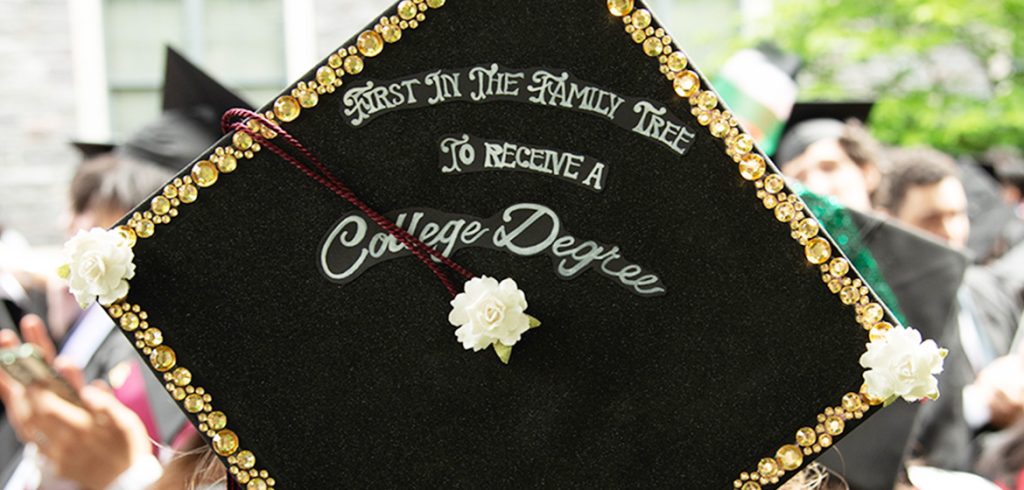
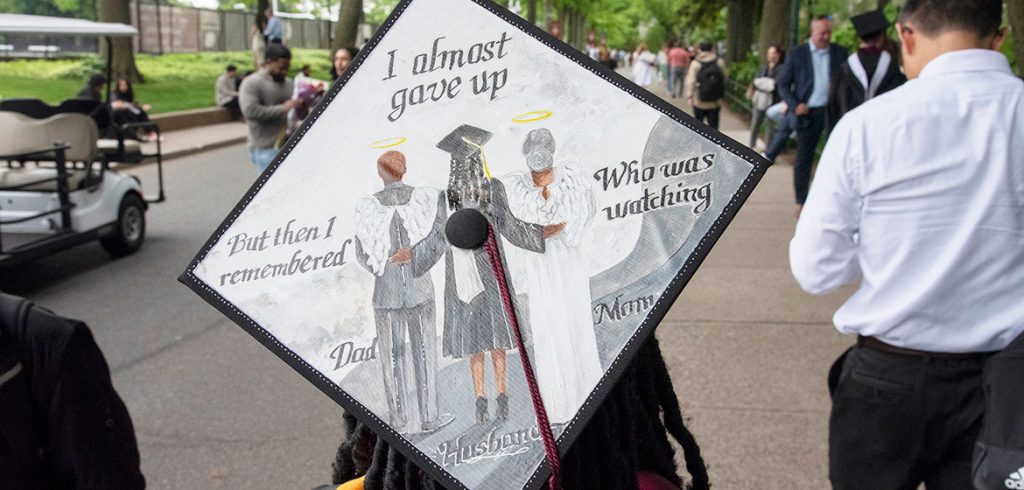
At Fordham’s commencement on May 18, members of the Class of 2024 showcased their artistry–as well as some architectural flair–on commencement caps dressed up with messages of pride and gratitude.
]]>

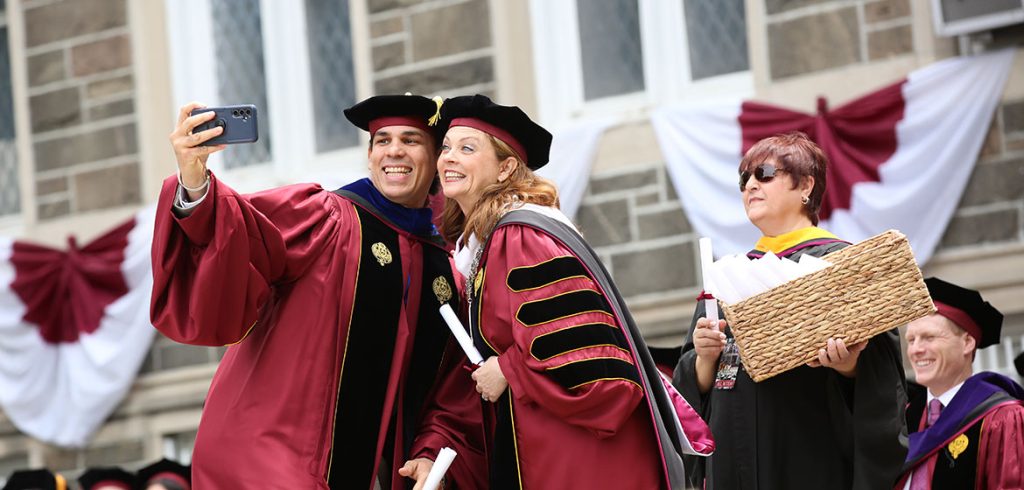
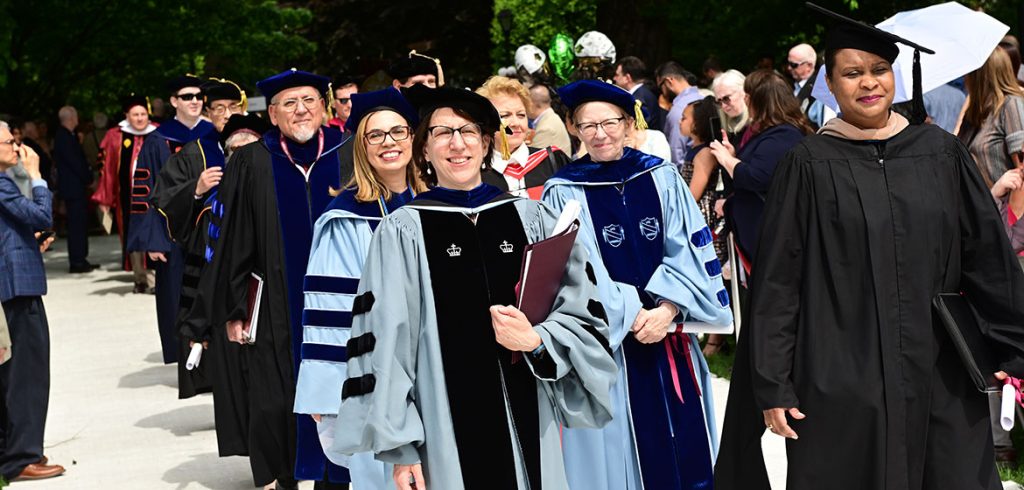
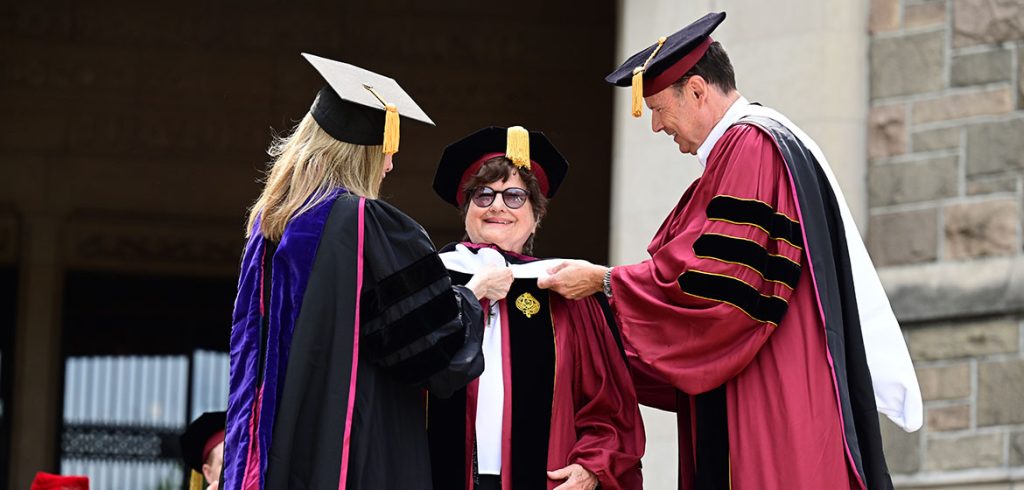

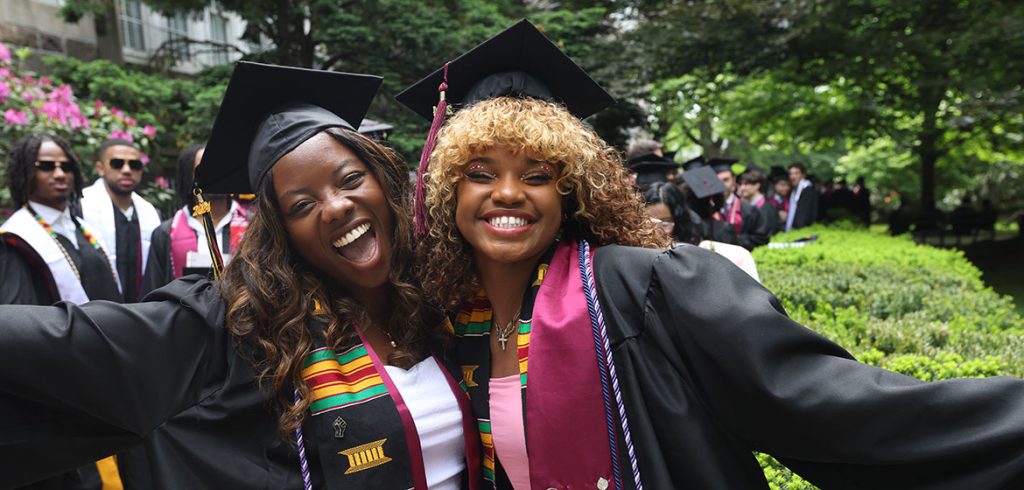
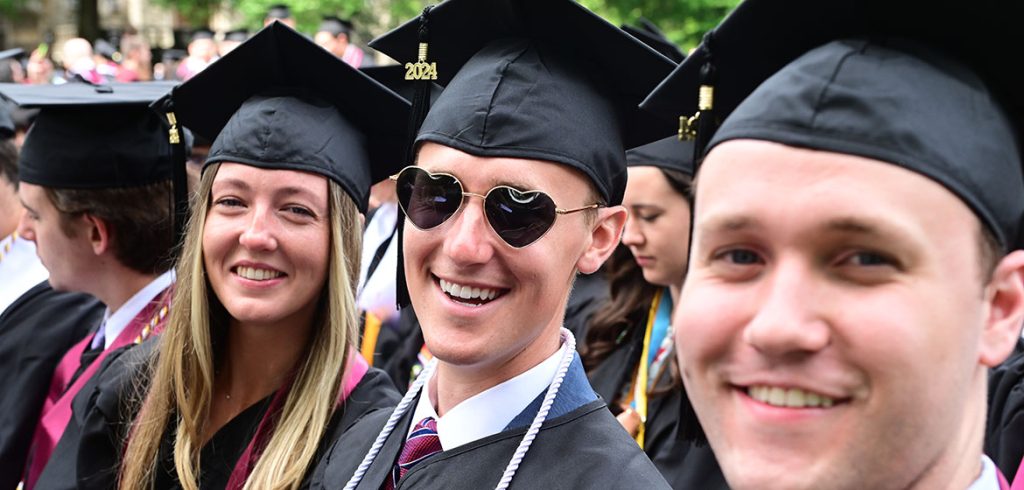


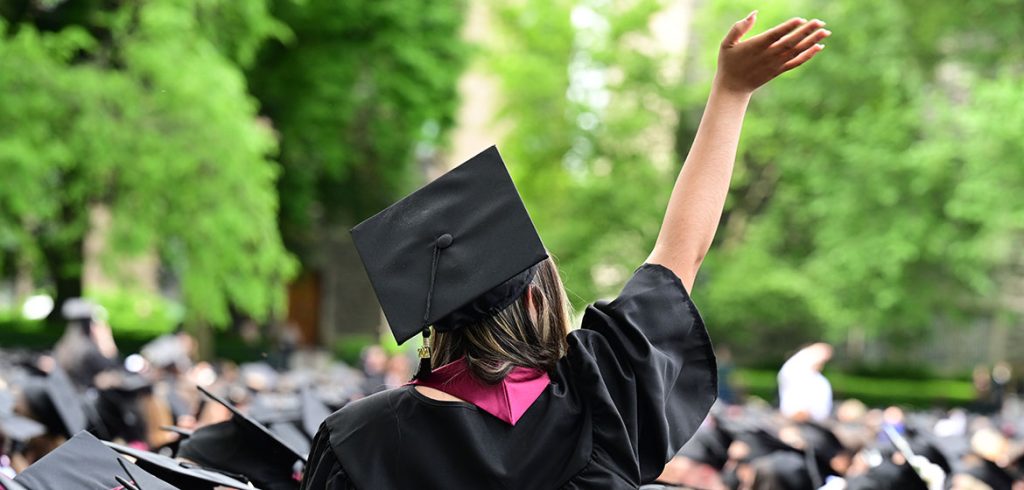

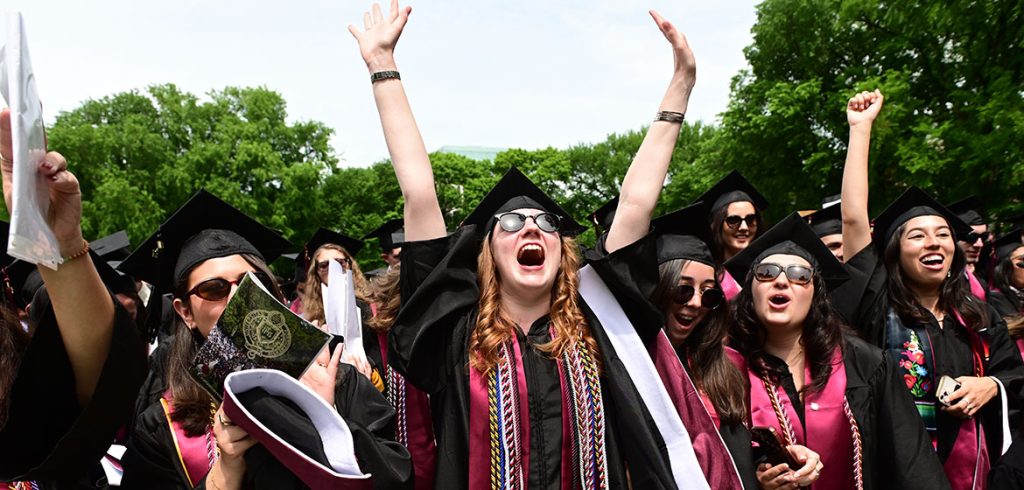
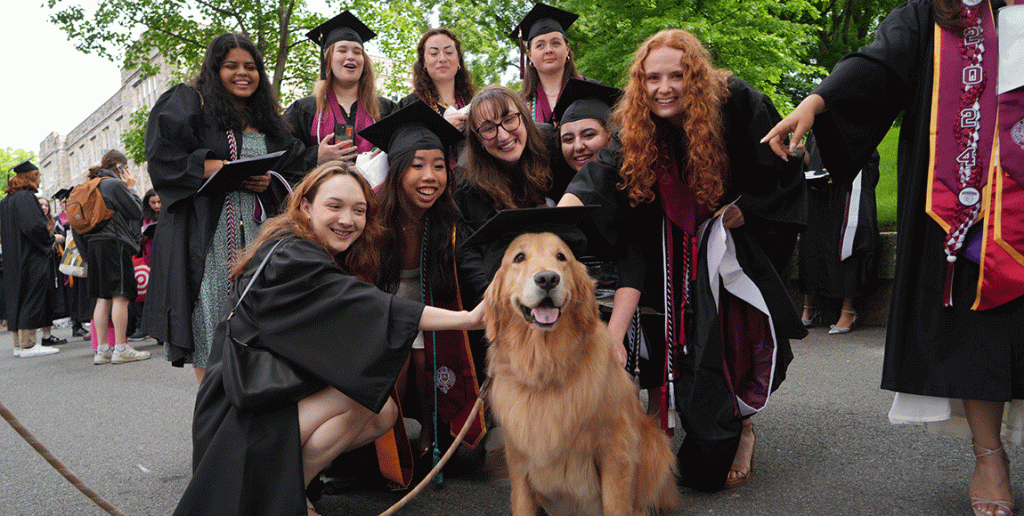
Our fates are united, Joseph Patrick Kennedy III told the Fordham Class of 2024, and peace is possible when we recognize that “our pathway forward is together.”
Speaking at Fordham’s 179th Commencement on May 18, the U.S. Special Envoy to Northern Ireland for Economic Affairs recalled that region’s painful history—and eventual peace—to illustrate that even amid longstanding war and division, there is reason for hope.
“While we may come from different backgrounds and perspectives, the lesson Northern Ireland teaches is that our future is shared,” he said from Keating Terrace on the Rose Hill campus, just after receiving an honorary doctorate from the University.
“It is as true in Belfast as in Boston. It is true across our United States. It is true in Israel and Gaza, where terror and heartbreak, violence, and suffering must give way to a shared future. And it is true in every other corner and cranny of our planet.”

A Bostonian who told graduates he loves New York (even if he can’t quite get behind the Yankees), Kennedy is a grandson of the former New York Senator Robert F. Kennedy. He represented the 4th Congressional District of Massachusetts for four terms before assuming his diplomatic role in 2022.
Northern Ireland’s journey from the strife known as the Troubles, which ended in 1998 with the Good Friday Agreement, is proof that change is possible, he told graduates.
“It’s not perfect. Like everything human, it is really messy and really hard. But 26 years later, the region is still at peace,” he said.
As the sun shone through clouds on the crowd of more than 20,000 people, Kennedy shared anecdotes about meeting people in Derry and Belfast who once were enemies but now are working together.
“There is a difference between being guided by the past and being held hostage by it,” he said.
“If we are bold and brave enough, we can learn to make space for each other, even when we disagree on really big things—if not for our benefit, then for those whose futures are yet to be written.”
He told graduates that the world they inherit needs them.
“It is a world that needs your vision and your grace. Your empathy and ambition. Your courage to choose to leave the world a little better than you found it,” he said.
“And please hurry. Your world awaits, and it needs your help.”
A Time to Celebrate
In her second Fordham commencement address, President Tania Tetlow acknowledged that this year’s ceremonies hold special resonance for many students whose high school graduations were disrupted by the COVID pandemic.
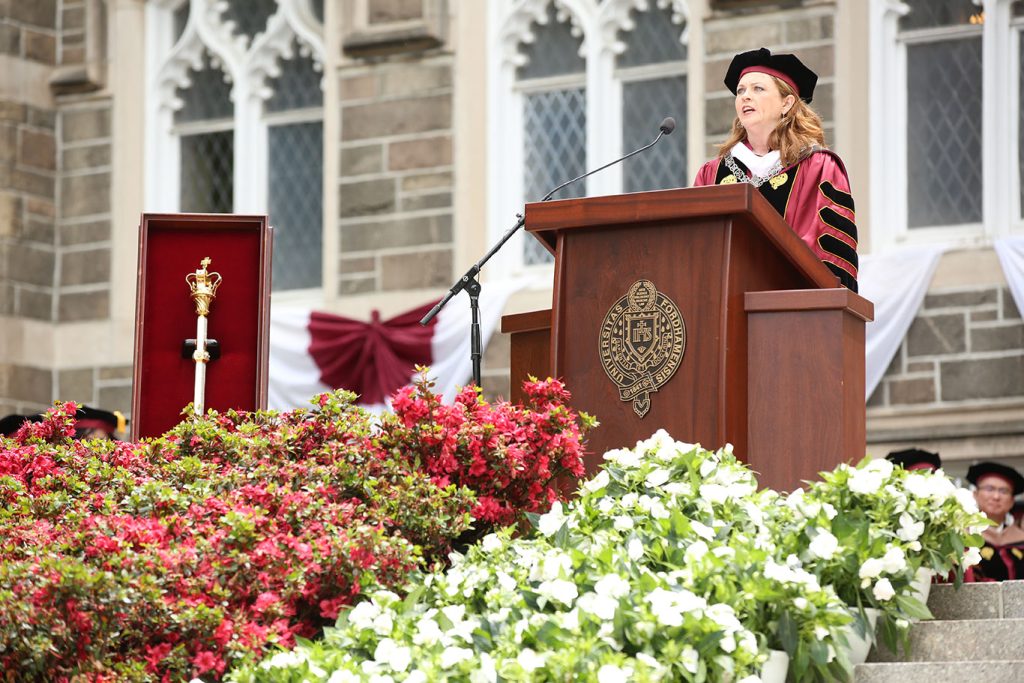
“Today is the day to glory in what you have achieved,” she said, noting that even the Empire State Building will be shining in the graduates’ honor tonight.
In graduating, students joined the ranks of millions of Jesuit-educated people around the world who can bond with each other simply by referencing the phrase cura personalis, or care for the whole person, she said.
“But this isn’t the kind of secret handshake that gets you insider entitlement. Instead, it’s an enormous responsibility that you carry with you forever,” she said.
“You came to Fordham with blazing talent, each of you blessed by abundant gifts from God. But—and this may be a rare thing to say at commencement—those gifts do not make you better than anyone else,” she said.
“What makes you special is how you use your gifts to matter to the world.”
The University officially conferred roughly 3,300 bachelor’s, master’s, and doctoral degrees at the ceremony. Including those who graduated in August 2023 and February 2024 and those who are expected to graduate in August 2024, the University will confer nearly 5,700 academic degrees in all.
In addition to Kennedy, Fordham conferred honorary doctorates upon two other notable figures: Sister Helen Prejean, author of Dead Man Walking and a leading global activist against capital punishment, and the University’s former board chairman Robert D. Daleo.
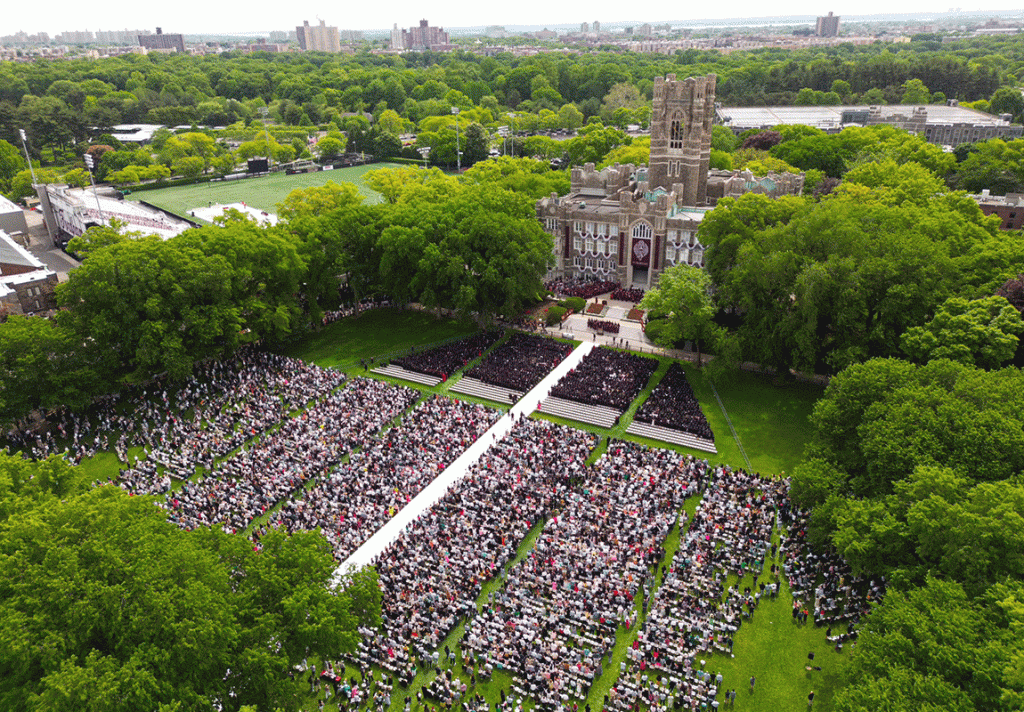
—Photos by Chris Taggart, Bruce Gilbert, Hector Martinez, and Taylor Ha
Watch the full ceremony here.
“I’ve long felt that there needed to be a spiritual component when we’re working with clients,” said Gibbs, owner of a seniors-focused business who is graduating with a master’s degree in mental health counseling and spiritual integration. “In my individual work with clients … their spiritual life was very much a part of how they were raised.”
The program, offered at the Graduate School of Religion and Religious Education, provided a “fantastic” education in mental health and spirituality that Gibbs thinks will become more sought-after. “I think this field is only going to expand,” she said.
Church, a ‘Second Home’
A New York City native, Gibbs is a granddaughter of Southern sharecroppers who remembers the bigotry her family faced after settling in the Rosedale section of Queens decades ago. She recalled church as “a second home … where we found support.”
She graduated from Baruch College and earned an MBA from Baruch and a master’s in vocational rehabilitation counseling from NYU. Later in her career, about 12 years ago, it was through her church that she developed the idea for her company, Safe Circle Inc., which serves seniors and caregivers in the New York City area. She enrolled in her Fordham degree program after its spirituality aspect caught her eye during an internet search.
After graduating, she hopes to expand her company to help women of color dealing with multigenerational trauma and incorporate more spirituality into its services. In addition, she said, “I have a strong leaning towards bringing mental health to the forefront, particularly within the Black church.”
“I think that the church is a good place to begin having these educational forums about mental health and normalizing the discussion about [it],” she said.
Standing on Others’ Shoulders
Key to her professional growth at Fordham was an eight-month internship with the Faith Mission Alcohol Crisis Center in Queens, where she gained experience in integrating spirituality into daily care. She got “a full visual of what alcohol and drug addiction can do to the mind and body,” and worked with clients to help them see the impact of drug addiction in their lives and identify its triggers. “The change when they’re drug free is remarkable,” she said.
Like many of her classmates, Gibbs was pursuing the 20-hour-a-week internship while going to school full time—something that was made easier by supportive, understanding professors. Her path to the degree was also smoothed by her encouraging “church family” at Bethany Baptist Church in Jamaica, New York, as well as support from family members like her daughter and her mother.
“I would come in some evenings and she would’ve come by the house—‘I left a plate for you on your stove,’” Gibbs said.
She’ll be thinking of them all at commencement.
“When you walk across that stage, you are walking across on other people’s shoulders, really,” she said. “If you’re blessed to have that support, they’re graduating with you.”
Remember, on the evening of May 18, New York’s Empire State Building will be illuminated in Fordham maroon for our graduates.
]]>Whether you’re celebrating graduation in Manhattan, Brooklyn, Jersey, or cozied up at home, there’s a spot for everyone to see the Empire State Building light up for our grads!
Check out our top picks for viewing (and photo-snapping) spots:
Bryant Park, Manhattan
Midtown-bound post-graduation? Heading toward Grand Central? Swing by Bryant Park for a seriously epic view of the Empire State Building lit up maroon.
Madison Square Park, Manhattan
This park offers amazing city views, making it the perfect spot to snap those unforgettable graduation pics with the Empire State Building in the background!
34th Street and Herald Square, Manhattan
Get ready for one of the best close-up street views of the Empire State Building. Don’t miss the chance to snap a pic as you stroll by post-graduation celebrations!
Union Square, Manhattan
Heading downtown? The lively Union Square offers a fun spot to catch a view of the famous skyscraper!
Washington Street between Front and Water streets, Dumbo, Brooklyn
There really is nothing like this picturesque sight of the Empire State Building beautifully framed by the Manhattan Bridge. Head over for a unique grad picture with the iconic landmark.
Liberty State Park, Jersey City, New Jersey
These stunning views don’t end in the boroughs! This Jersey park serves up breathtaking shots of the Empire State Building and the Manhattan skyline. You won’t want to miss it.
Won’t be nearby? Want to share this special celebration with loved ones who are far away? You can still catch the iconic building lit up in maroon on the Empire State Building’s live cam.
Don’t forget to share your pictures of this special tribute via email [email protected] and tag us @fordhamuniversity or use #Fordham2024 on social!
Learn more about Fordham’s 179th Commencement.
]]>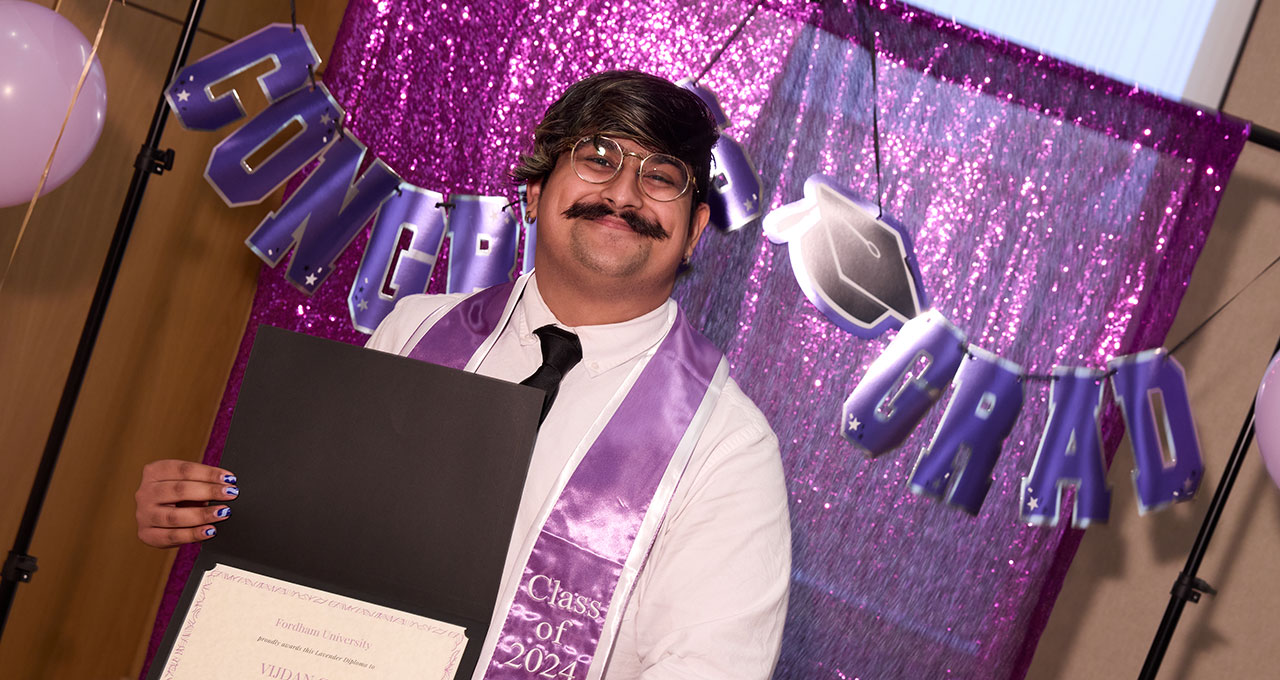


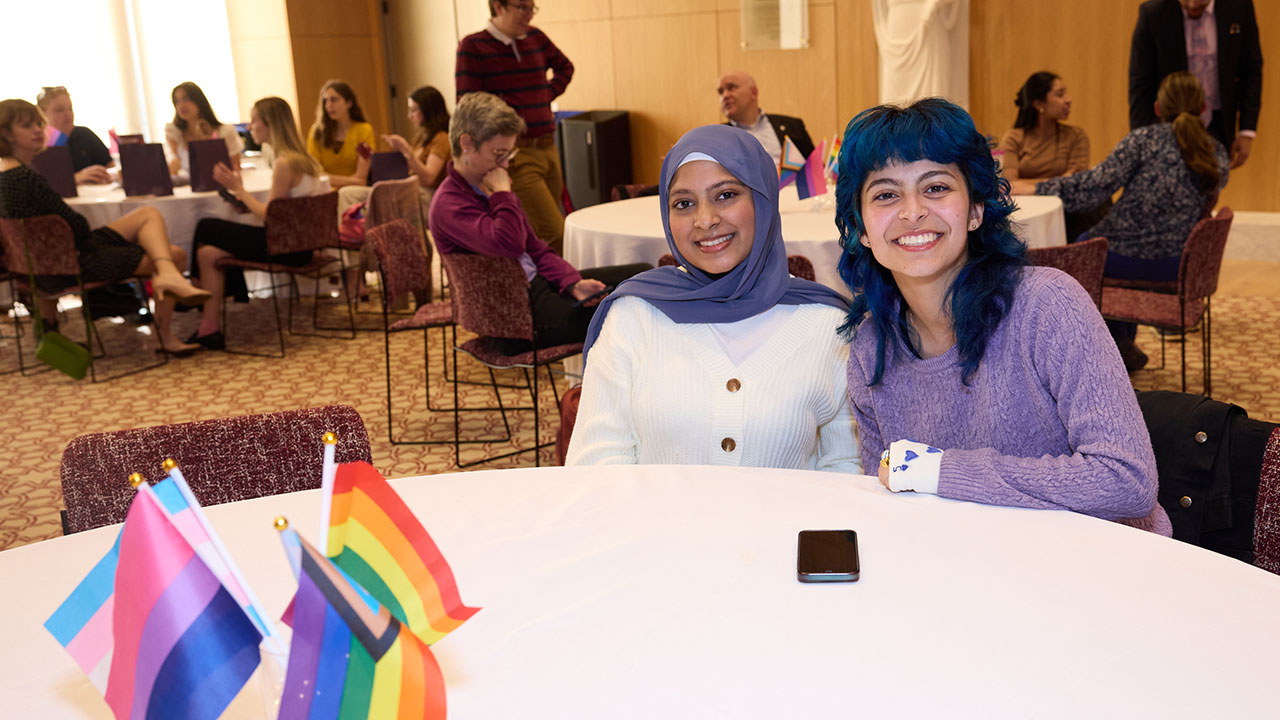


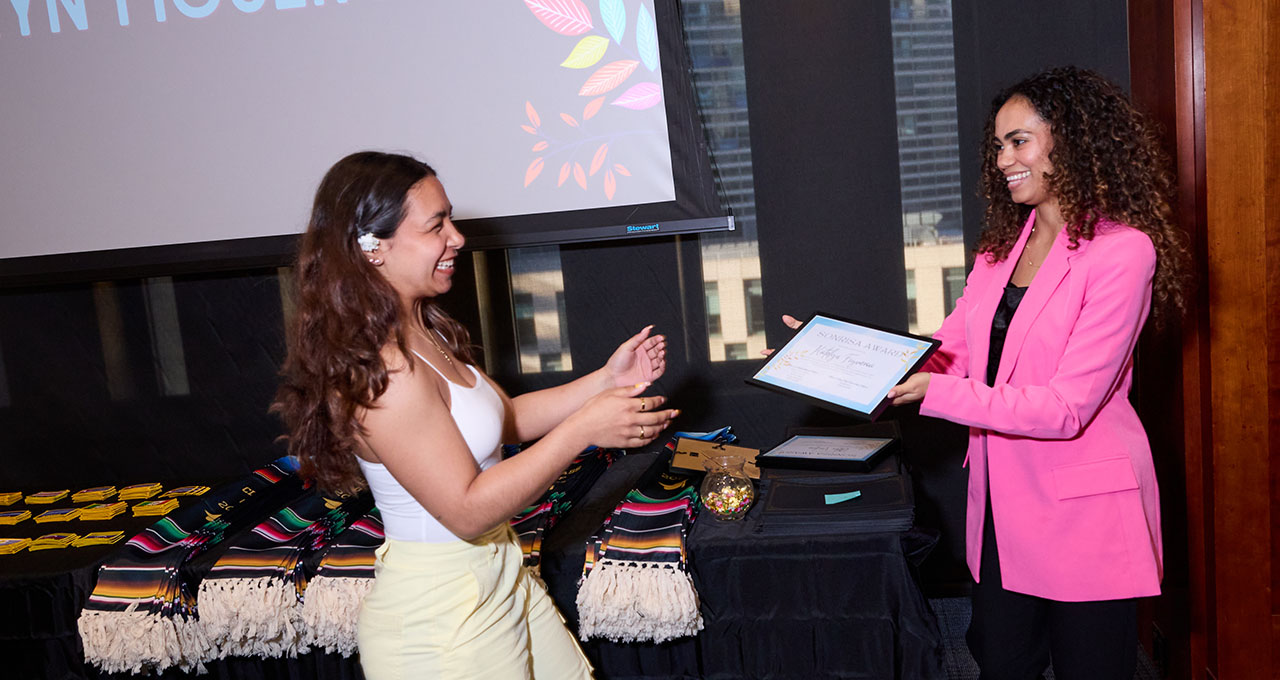


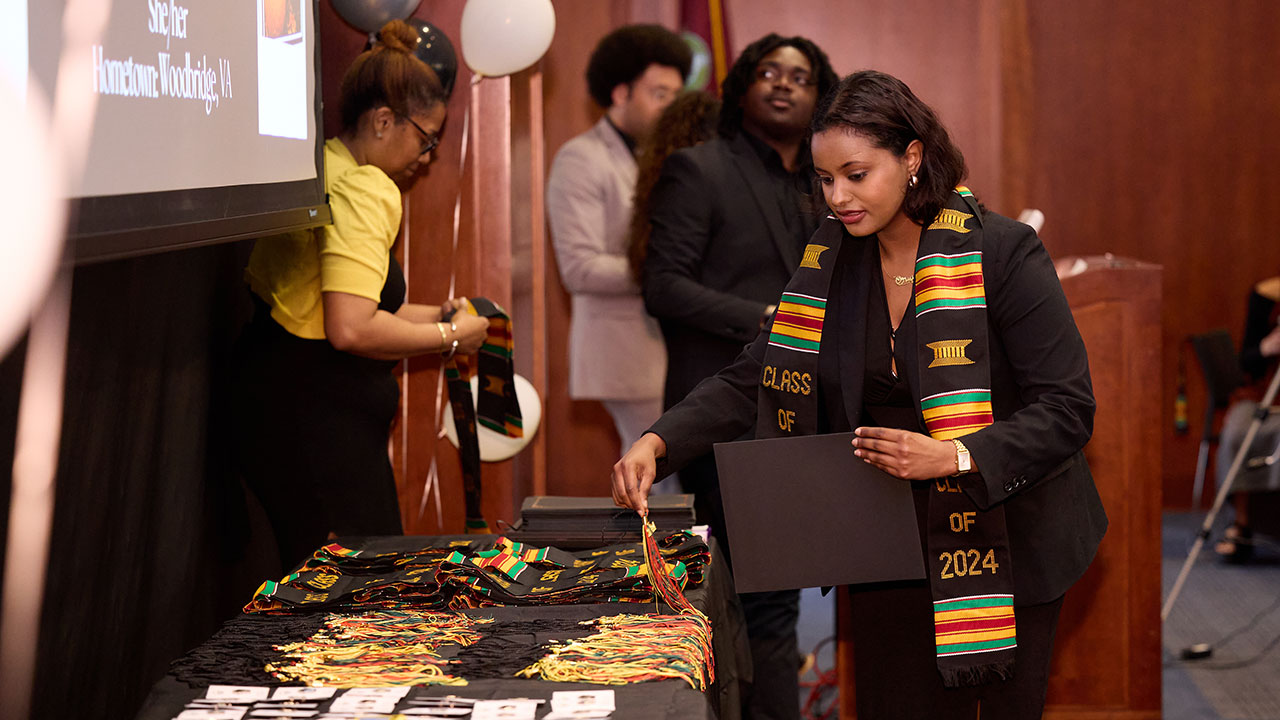
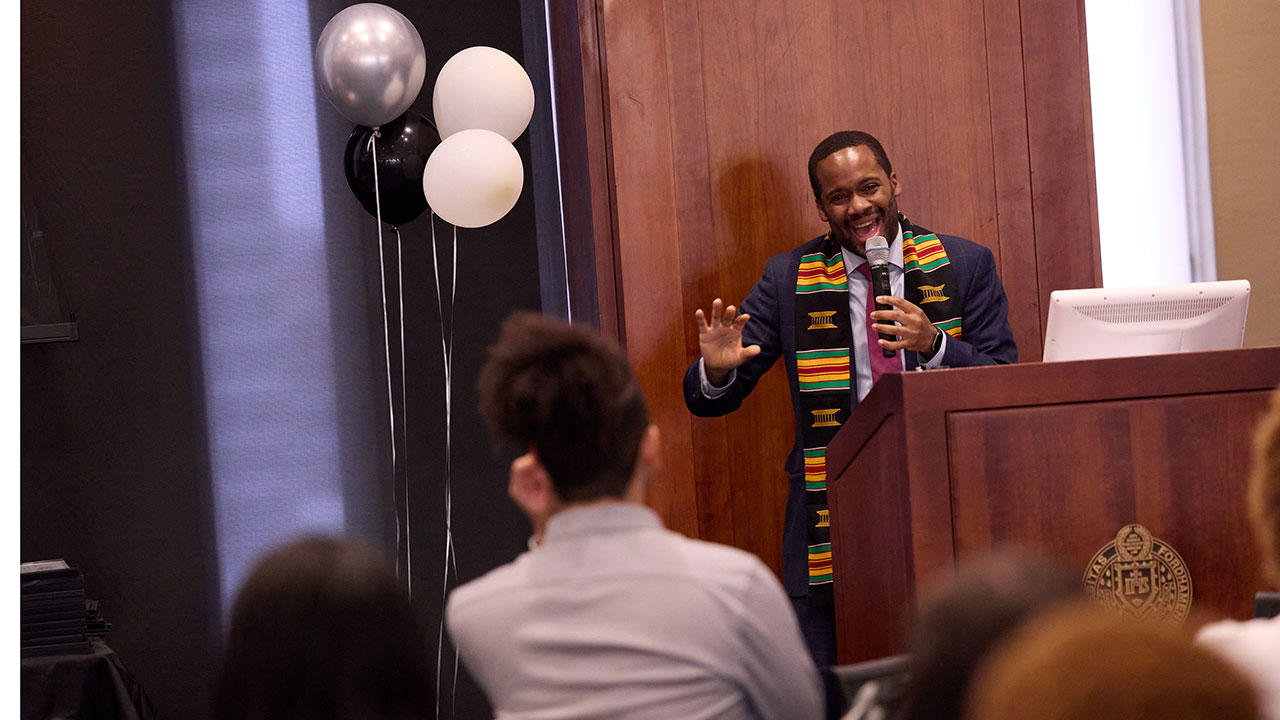
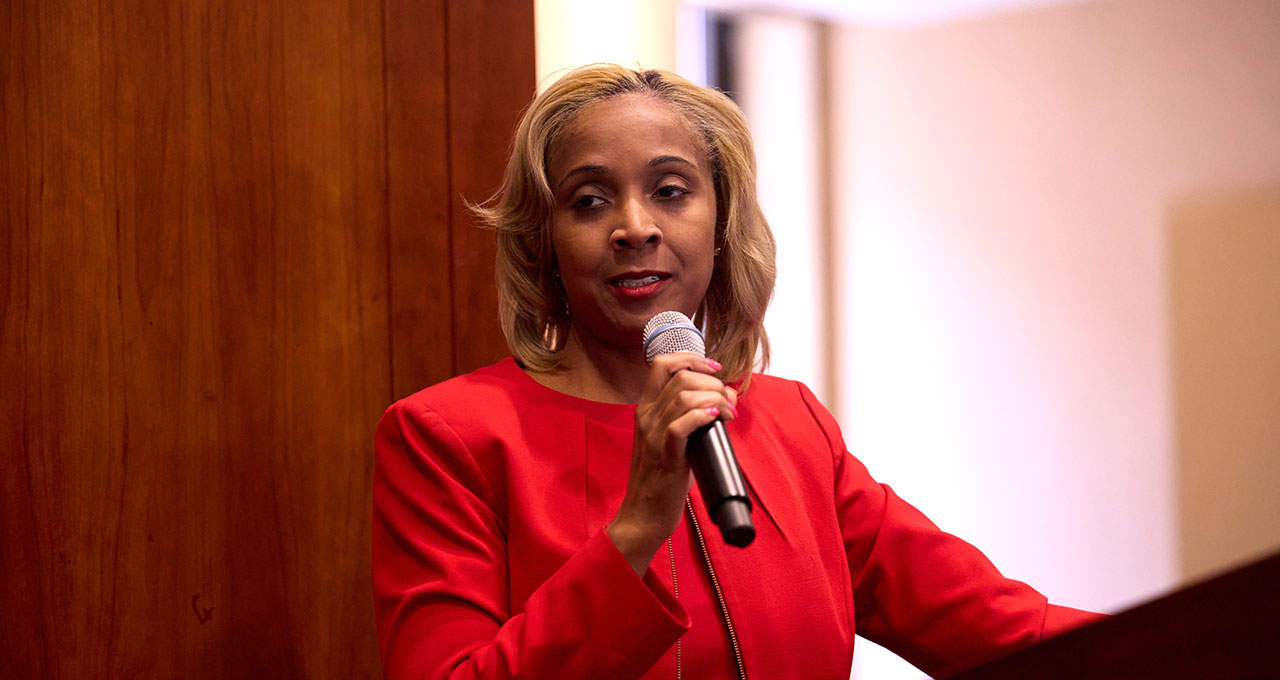
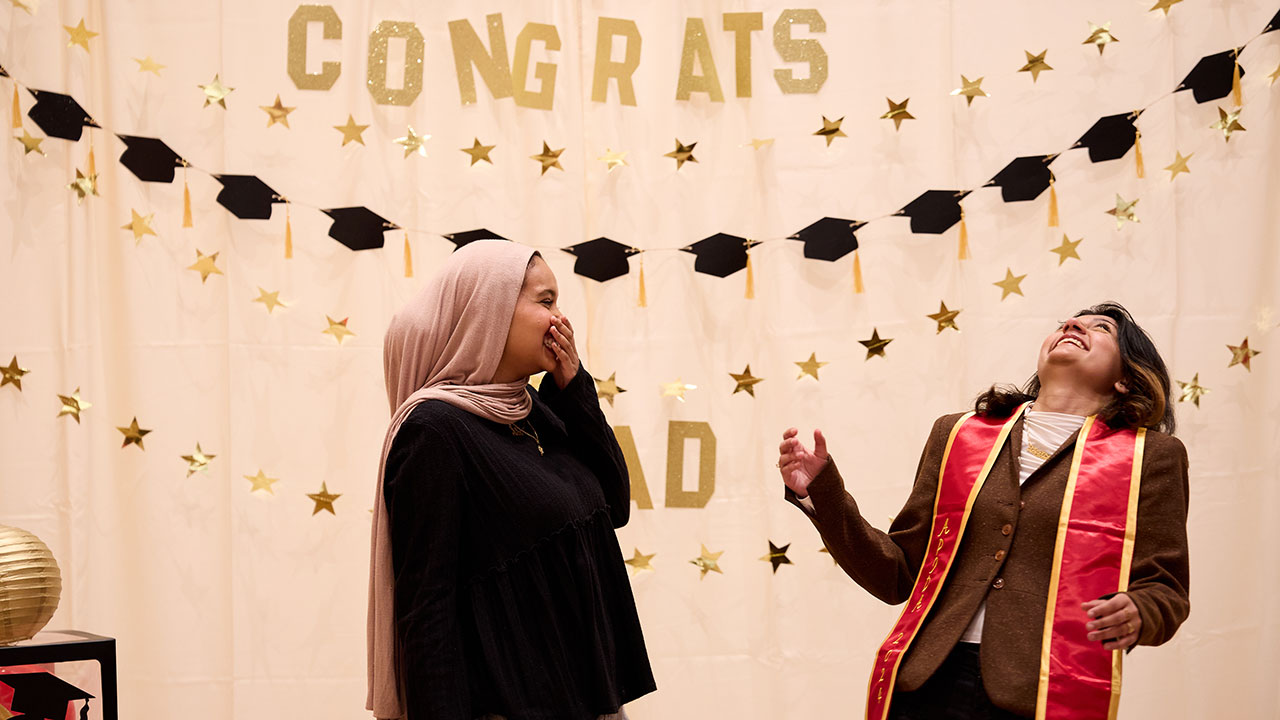
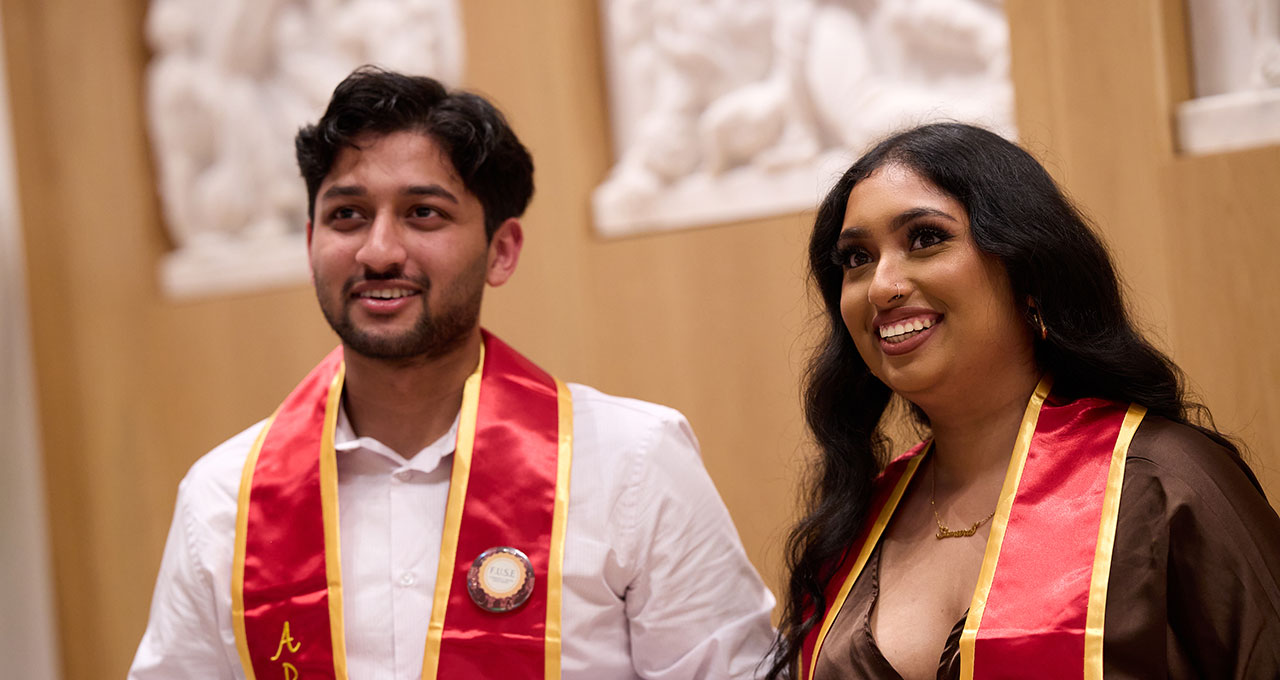
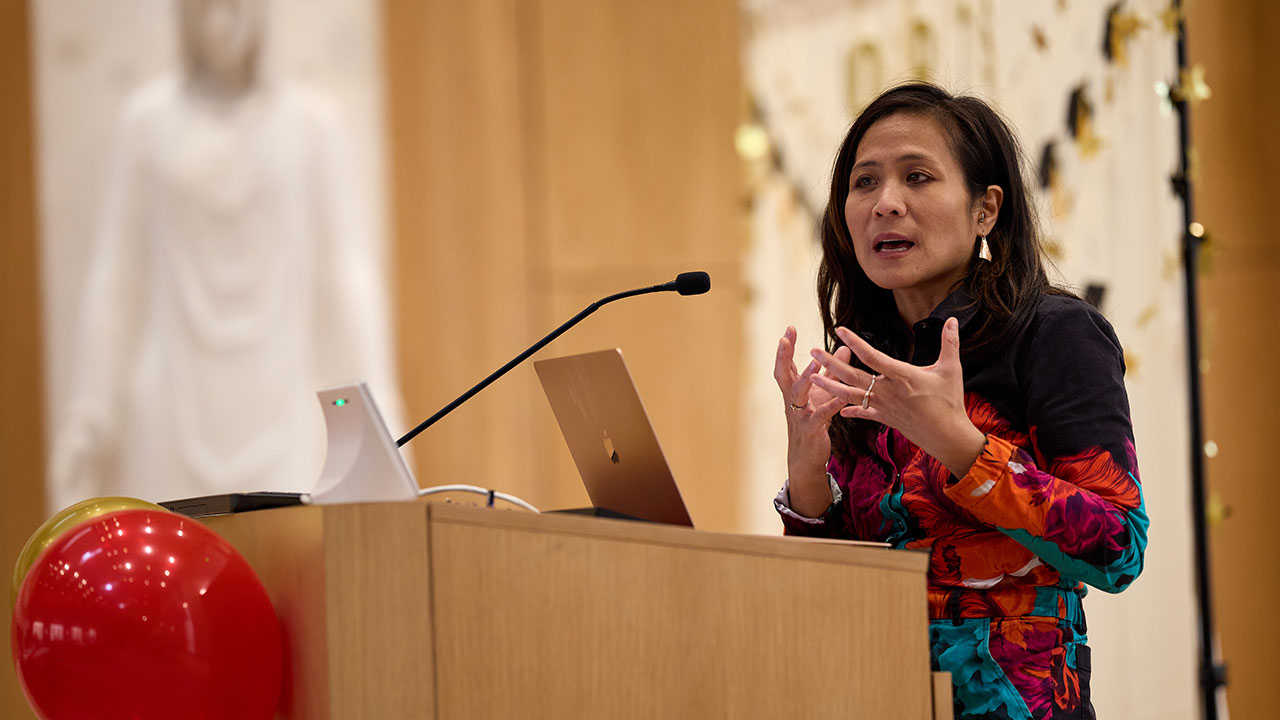
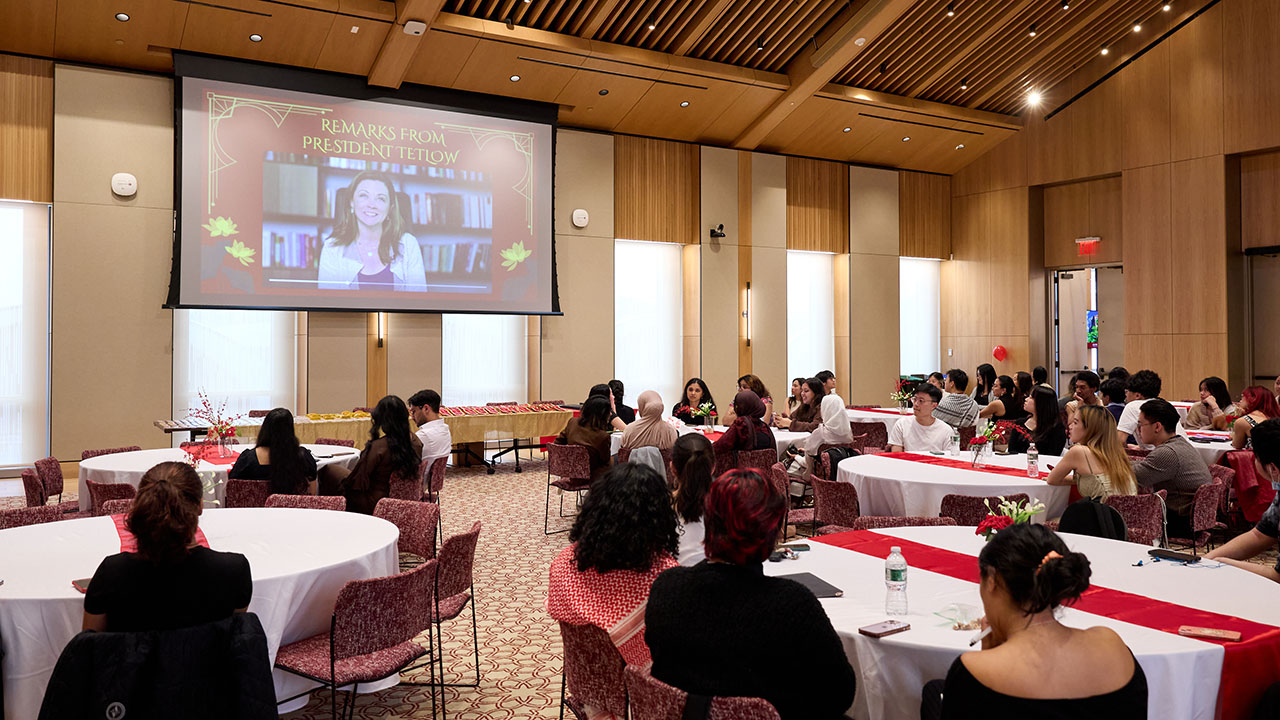
Photos by Argenis Apolinario
Graduating seniors celebrated their heritage and culture at four diversity graduation ceremonies held from April 30 to May 6.
“I am so proud of what each and every one of you has achieved,” Tania Tetlow, president of Fordham, said in a video message to students.
“Take a moment to give yourself a hug and to revel in everything that you’ve achieved because it is an extraordinary thing, these years of hard work and determination and talent, and glorious love of learning.”
In total, more than 300 students were recognized at the Asian, Pacific Islander, Desi American (APIDA); Black; Latine; and Lavender (LGBTQ+) graduation celebrations.
Held at both the Lincoln Center and Rose Hill campuses, the celebrations were sponsored by the Office of Multicultural Affairs, Office of the Chief Diversity Officer, Office of the President, and the 2024 Senior Week committees.
Remember, on the evening of May 18, New York’s Empire State Building will be illuminated in Fordham maroon for our graduates.
Below are the award winners for each graduation.
Lavender Graduation
George Takei Arts & Media Award – LC Recipient: Maura Johnston
George Takei Arts & Media Award – RH Recipient: Julia Patterson
Marsha P. Johnson & Sylvia Rivera LGBTQ+ Activism Award – RH Recipient: Dorothy Bogen
Marsha P. Johnson & Sylvia Rivera LGBTQ+ Activism Award – LC Recipient: Kenneth Tang
Audre Lorde LGBTQ+ Research Award – RH Recipients: Fareea Khan and Tarchithaa Chandra Sekharan
Fr. Bryan N. Massingale Faculty/Staff LGBTQ+ Award – LC Recipient: Joe Corcoran
Fr. Bryan N. Massingale Faculty/Staff LGBTQ+ Award – RH Recipient: Juan Carlos Matos
Award of Excellence for Outstanding Contributions to the Office of Multicultural Affairs: Dorothy Bogen
Latine Graduation
Sonrisa Award – LC Recipient: Katelyn Figueroa
Sonrisa Award – RH Recipient: Alan Ventura
Estrella Award – LC Recipient: Ernesto Perez
Estrella Award – RH Recipient: Caitlin Asper
Pa’Lante Award – LC Recipient: Andy Cuzco
Pa’Lante Award – RH Recipient: Hector Cruz
Black Graduation
Black Leadership Award – RH Recipients: Tamia Chaney, Chelsea Usiomwanta, Alan Ventura
Black Leadership Award – LC Recipients: Katelyn Figueroa, Rebecca Richmond, Mary Bookman
Black Leadership Award in Athletics – RH Recipient: Skylar Harris
Black Leadership Award in the Fine Arts – LC Recipient: Kierstin Oliver
Black Leadership Award in the Fine Arts – RH Recipient: Zhane Coleman
Black Excellence in STEM Award – RH Recipients: Kennedy Jeter and Kiara Pile
Black Excellence in Business Award – RH Recipient: Janel Codjoe
APIDA (Asian, Pacific Islander, Desi American) Graduation
]]>Lotus Leadership Award – RH Recipients: Tarchithaa Chandra Sekharan and Elena Roden
Lotus Leadership Award – LC Recipient: Kenneth Tang
Most Likely to Sell Out a Lincoln Center Concert: Marie Isabelle Antendido
Most Likely to be on the Cover of Vogue, GQ, Elle, and/or Harper’s Bazaar: Meilin Renee Morefield
Most Likely to Start a Successful Youtube Channel: Julie Kae Trohan
Most Likely to Become Tik Tok Famous: Genesis Yi
Most Likely to Survive the Last of Us: Stacey Dana Zaragoza Cajita
Most Likely to Win Physical: 100: Alexander Joel Lang Hom
Most Likely to be the CEO/Director of their own Company: Yoshimi Pualani Eder
Award of Excellence for Outstanding Contributions to the Office of Multicultural Affairs: Kenneth Tang
“I thought I should get proper professional experience and a business school education,” Patel said, adding that he gained even more than he imagined when he began his M.B.A. experience. “I learned how to work as a member of a team, and I would have to participate and present in a class. This was very new to me. I was put into situations that I would not normally be exposed to, and [that]has boosted my confidence. I learned about everything in such a structured and precise manner, exactly how it should be.”
Patel earned his undergraduate degree in geology at the M.G. Science Institute at Gujarat University, a typical field that interested him and would prepare him to join the civil services in India. However, after working at Shree Umiya Developers, the company his father established, his vision for his future changed. Serving as general manager, Patel assisted in the completion of a luxury bungalow project and, when each of the 21 properties sold, he knew the experience was the first step toward his new career journey.
Patel notes a few M.B.A. courses that are particularly relevant to his next chapter. Strategic Branding not only focused on “how to build a brand, but how to differentiate it,” valuable skills he will use to grow the real estate development business. In Marketing with Cultural Intelligence, Patel discovered how different modes of marketing appeal to different cultures. This enlightenment came from learning specific practices that cater to Indian consumers and clients, which inspired him to reflect upon his own culture from a marketing perspective.
“When I would visit Indian grocery stores, I would just go as a consumer, and I would not think why this item is placed here, and how it is different from the American way,” he explained. “After this class, my understanding of marketing within my cultural context deepened.”
Patel took advantage of many opportunities to build his leadership skills as an M.B.A. student. As the president of the Student Advisory Council, he and his team worked to enhance the student experience and campus culture by coordinating events, balancing budgets, and serving as a liaison between students and the School’s administrators.
An accomplished equestrian who enjoys adventure sports and the outdoors, Patel looks forward to life in North Carolina and to his new role that will keep him connected to family and friends from India.
“I am lucky to have my own family business here,” he said, adding that while he is excited for the next chapter in his career, he will miss the home he found at the Gabelli School of Business. “For one and a half years, I’ve been used to the Gabelli School way of living, meeting people, studying, attending events, and everything else. I will miss that when I [leave]for North Carolina.”
– Written by Gabrielle Simonson for Fordham Business Magazine
Remember, on the evening of May 18, New York’s Empire State Building will be illuminated in Fordham maroon for our graduates.
]]>At first, Farrell was concerned about the new format, but when she began studying, her apprehension was quickly replaced with confidence.
“My biggest fear was that I was going to go in knowing absolutely nothing, and that could not have been further from the truth,” she said, adding that so far, “every single accounting class” she’s taken at the Gabelli School is reflective of the new exam content.
Farrell took the exam’s Financial Accounting and Reporting section in March, and has three more sections to go. In December 2023, she completed her bachelor’s degree in accounting information systems and is now working toward her master’s in professional accounting. She enrolled in the Gabelli School’s 4+1 program to complete both degrees in under five years.
Farrell also secured a position with a “Big Four” accounting firm—PricewaterhouseCoopers—which she’ll begin in January. This highly coveted opportunity was the result of a successful internship in the firm’s external assurance division.
“I’m excited because it’s such a great company, she explained. “They take a genuine interest in the interns and I formed so many connections in the time I was there. I’m thrilled to be doing meaningful work—helping ensure the integrity of financial statements that are going to get issued—and doing it at a firm where the values and people resonate with me.”
As a woman in accounting information systems, the job stability and integration of cutting-edge technology are part of what attracted Farrell to the field.
“I honestly don’t know why more women aren’t drawn to this field,” she said. “Women can be very organized, and I found that the characteristics of being organized and analytical aligned with both accounting and myself.”
While Farrell’s decision to apply to Fordham’s Gabelli School was an easy one—she grew up in nearby New Jersey and liked the idea of studying business in New York City—she wasn’t sure what career path to pursue. That changed after her first accounting class when she realized that she had a natural aptitude for accounting and technology.
As an undergraduate, Farrell served as the president of Beta Alpha Psi, the honor society for accounting, finance, and information systems, and was a member of Smart Woman Securities, where she placed first in a stock-pitch competition. She also was a teaching assistant in the Gabelli School’s Ground Floor course for first-year business students, a freshman advisor, and a member of Fordham’s women’s club soccer team throughout her undergraduate years.
Farrell is the fourth member of her family to find her place in accounting, following her father, James Farrell, GABELLI ’98, and mother, both CPAs, and her sister who also works in the field.
“Ever since I left high school, my parents said, ‘The world’s your oyster. Whatever you want to do, just do it,’” Farrell said. “They’re so supportive. They think there are no limits to what I can do.”
—Written by Gabrielle Simonson for Fordham Business Magazine
Remember, on the evening of May 18, New York’s Empire State Building will be illuminated in Fordham maroon for our graduates.
]]>A graduating senior and valedictorian at Fordham College at Rose Hill, Tejiram was accepted to three medical schools. She’s planning to attend the Icahn School of Medicine at Mount Sinai in Manhattan next year.
“Medicine is so much more than just the [coursework]—there’s a heart to medicine,” she said. “It involves bonds of compassion; you’re there for somebody, and not only just to be there to feel with them, but to do something about it.”
Ahead of graduation, Tejiram, who is on the pre-health track, shared some advice for students interested in medical school.
Explore unique research opportunities—when you’re ready.
Tejiram didn’t start working in a lab until her sophomore year, which she said allowed her to adjust to college and better understand the science behind the research.
Since then, she’s worked on two different research projects. She studied diseases such as age-related blindness in the vision lab of Silvia Finnemann, Ph.D., where she worked on a project that tests treatments for mice with vision defects.
She also worked with Rachel Annunziato, Ph.D., on a clinical research project at Elmhurst Hospital in Queens—her hometown. The project aimed to engage at-risk patients and reduce medicine avoidance.
“For some patients, I’ve been able to see them from the beginning to the end of the study, which has been really great,” she said. “I’m really excited to see the impact.”
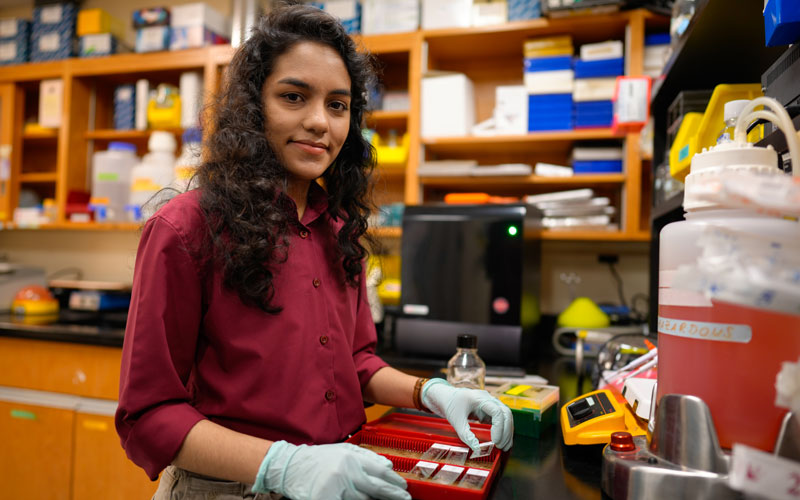
Look for lessons that translate.
In both research projects, Tejiram said she was looking for lessons that “can be easily translated” for medical school.
“For example, I do live tissue imaging,” she said. “It’s taught me how to balance precision and also time efficiency because you have a short window of time to work with the tissue. I think that’s going to be really important going into the fast-paced environment of medicine.”
Through her work at Elmhurst Hospital, Tejiram said she’s gained strong patient skills.
“Being able to sit with them and talk with them and hear their stories—I think I’m going to need that … so they can trust me as their physician,” she said.
Make a plan for applying to med school.
Tejiram said that the application process lasted about a year, so planning things like coursework and when to take the Medical College Admission Test (MCAT) was essential. Fordham advisors helped her navigate the process.
“I started applying in junior year—I had to take the MCAT, and then I had to do the primary application,” she said, noting that schools also send a secondary application.
She spent last summer writing essays and submitting secondary applications before interview season started in the fall. She got her decisions starting in February.
Expand your studies beyond your major courses.
Tejiram minored in bioethics, an area she discovered after taking a philosophical ethics course through Fordham’s core curriculum.
“I realized how many ethical dilemmas come up in daily life, but especially in a field where you’re dealing with patients and human lives,” she said.
Find supportive mentors and ask them for guidance.
When she was deciding if she wanted to go straight into medical school or take a gap year, Tejiram said she relied heavily on the advice of her Fordham mentors.
“Those mentors, those support networks I found have been so instrumental throughout my whole journey, and I think it’s really important to remember that you don’t have to do it alone,” she said.
Remember, on the evening of May 18, New York’s Empire State Building will be illuminated in Fordham maroon for our graduates.
]]>